THESE ARE THE FORENSIC DOCUMENTS THAT
RELATE TO MY SON'S ACCIDENT
This includes police notes, sketches, letters and other records of interest |
| Note: For greater clarity of text images click the "enlargement tool" when the image opens on cross-refencing of data. For important forensic investigation of details click the "enlargement tool" on the photographic images. |
Img091 to 096 (below) - Report of James M Green, G E Engineering, 120 Kalmia Drive, Ashville, Norh Carolina, United States
Resource Engineering was the former name. Note that James M Green does not refer to the vehicle's brake mark on the road to give the estimated speed of the vehicle at 40 to 50 kilometers per hour at the time of impact using forensic science - please refer to Img044, 048, 049 & 050. (Note: for greater clarity of text images click the "enlargement tool".)
James M Green looks at the bicycle's "frame" to estimate the speed of the utility at the time of it hitting the Andrew. James M Green ignored the police photographic evidence and my evidence that I was told by the police that Andrew had fallen into the back tray of the utility. James M Green refers to a "tear shaped" pattern of debris? As far as I am concerned, James M Green produced a flawed report deliberately.
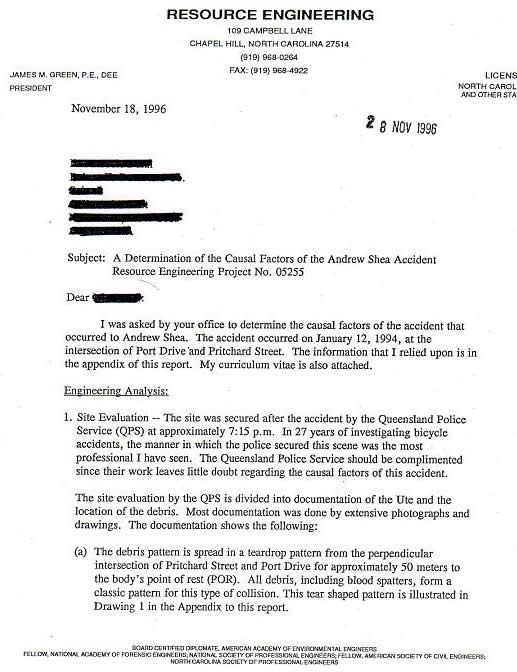
|
Img092 - James M Green's report - 2nd page
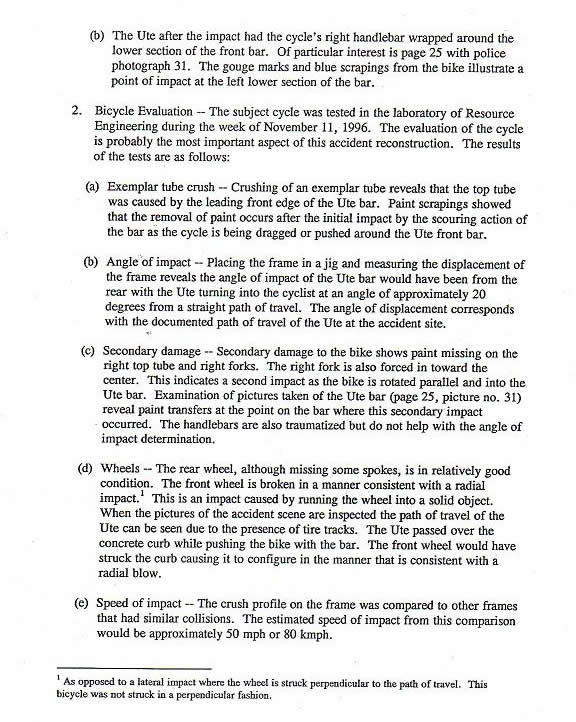
|
Img093 - James M Green's report - 3rd page
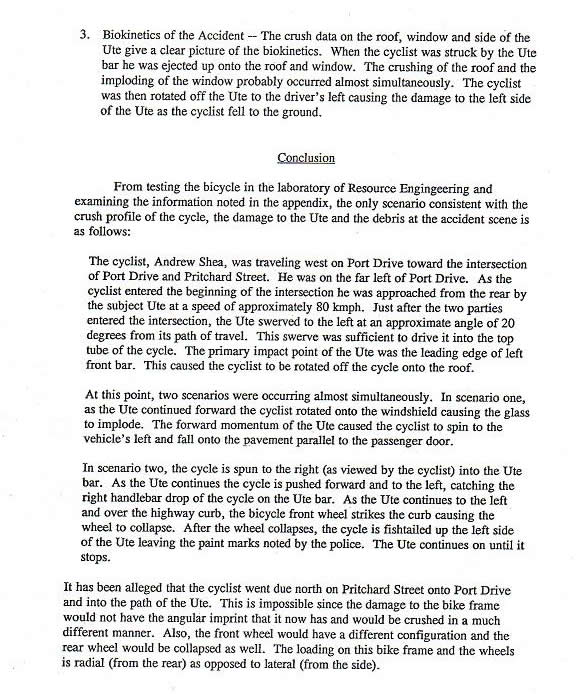
|
Img094 - James M Green's report - 4th page
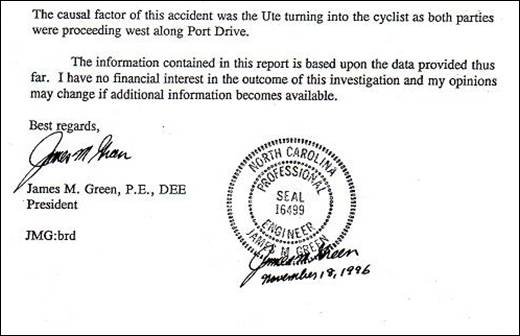
|
Img095 - James M Green's report - 5th page
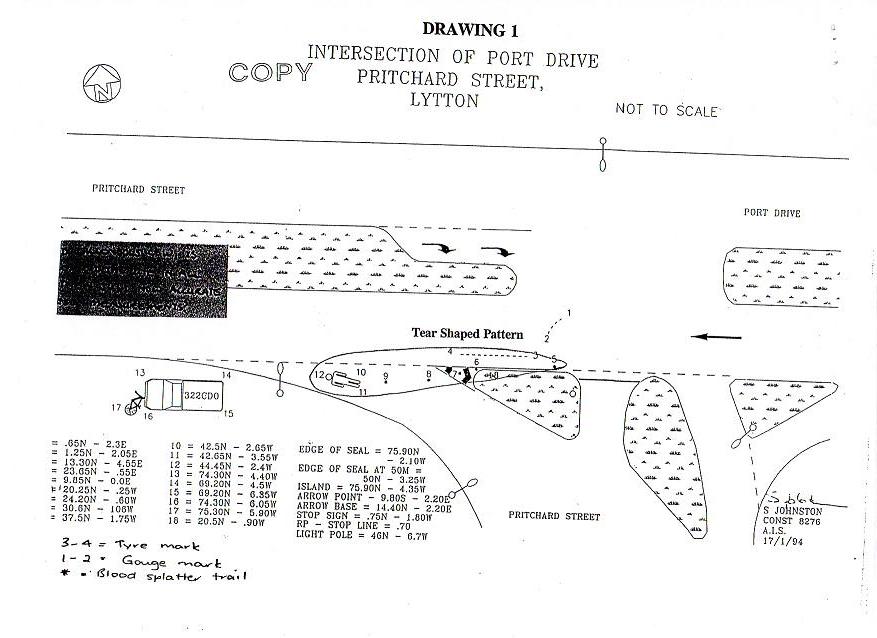
|
Img096 - James M Green's report - 6th page
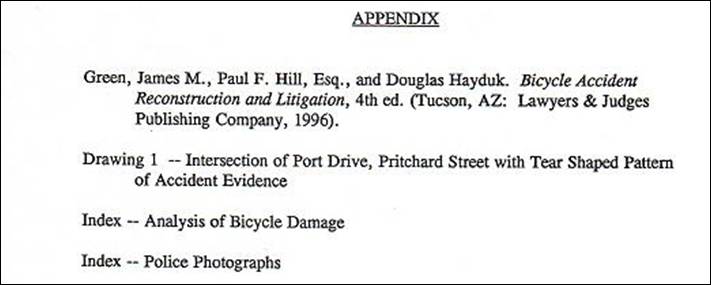
|
Img097 to Img112 - Constable Samantha Johnson's Coronial Report
At the adjourned hearing into Andrew's death on 13 October 1997 Constable Samantha Johnson giggle a lot. Her behaviour was rather odd and unwarranted. Constable
Samantha Johnson did not produce a police note book, despite my requests for same. Constable Samantha Johnson did not identify the point of impact of collision between Andrew and the vehicle on any of her diagrams. She did not depict the path of travel of Andrew and the vehicle prior and after the point of impact (collision)
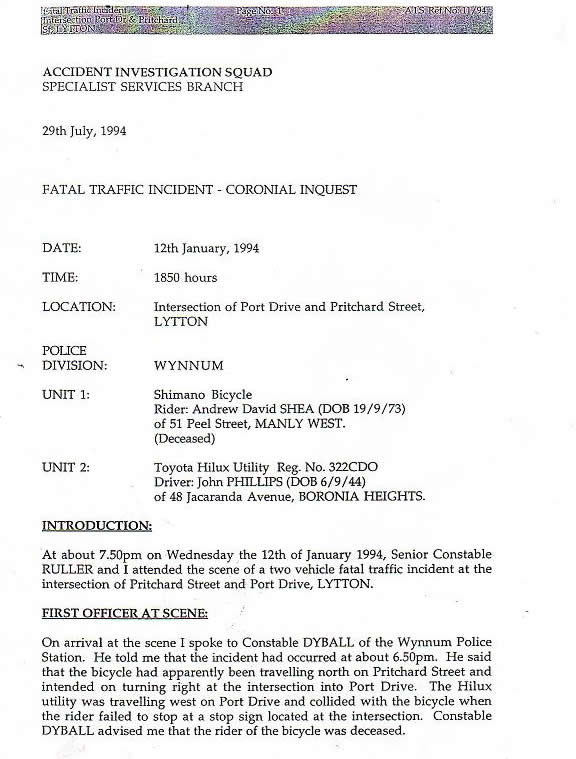
|
Img098 - Second Page Coronial Report
The speed limit prior to the intersection and through the intersection is 60 kilometers per hour. Constable Samantha Johnson wrote 80 kilometers per hour so that this speed limit would fit in with her fabricated straight line throw theory of Andrew after he was hit by the vehicle in the middle of the intersection with the vehicle which was supposed to be going at 80 kilometers per hour
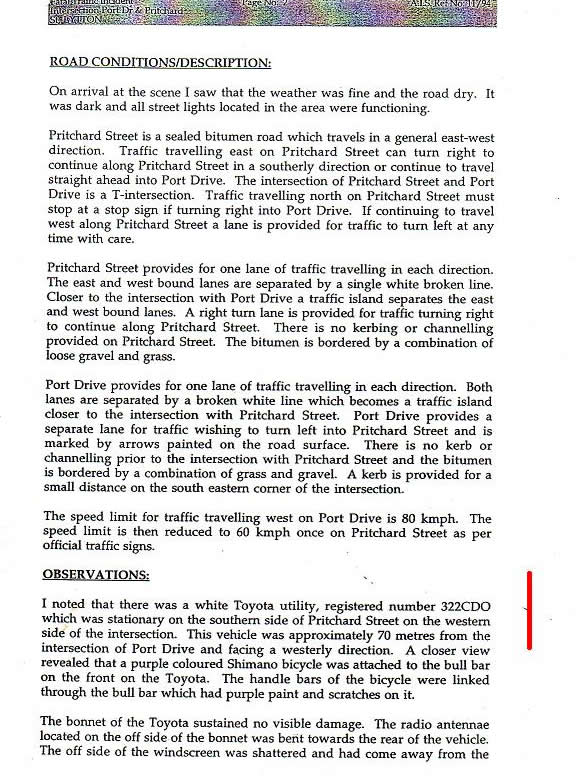
|
Img099 - Third Page Coronial Report -
There was no explanation by Constable Samantha Johnson why the Andrew's blood was in that position on the vehicle. Please view the photographic images of the blood as described - Img015, 016 and 017
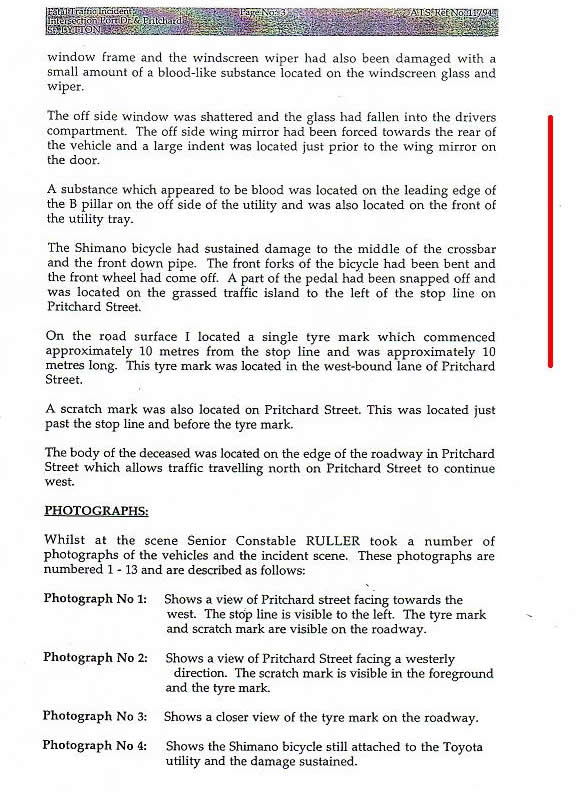
|
Img100 - Fourth Page Coronial Report
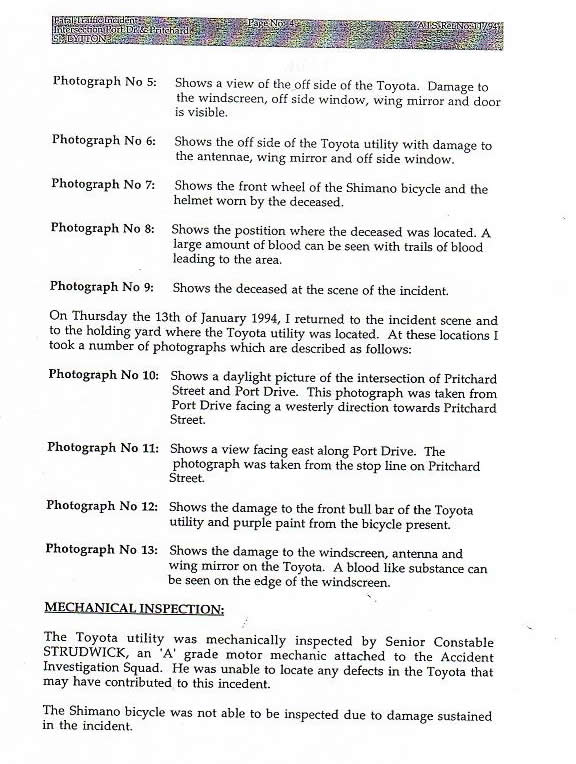
|
Img101 - Fifth Page Coronial Report
Constable Samantha Johnson's
description of the collision does not make sense. Constable Samantha Johnson says that witness Fiore Zulli said that he did not see the collision, but he saw my son fly forward after the hit. The question to ask is - "How did he know it was a hit if he did not see the hit?"
Constable Samantha Johnson, Constable Ben Dyball, Sergeant John Ruller, Fiore Zulli are trying to make out that my son was a human cannonball and that he flew through the air at a distance of 45 metres. Read about a human cannonball whose average distance is 43 metres and this one soars approximately 21 metres high - by clicking here. That is they are trying to make out that Andrew came out of a T intersection, hit the left passenger door and then his body changed directions from a northerly line of travel to a westwards line of travel of 45 metres, with Zulli stating that he saw him soaring 5 to 15 metres high. You will note from the photographs of Andrew after the accident that his head is still intact, and that there is no damage on the bicycle helmet.
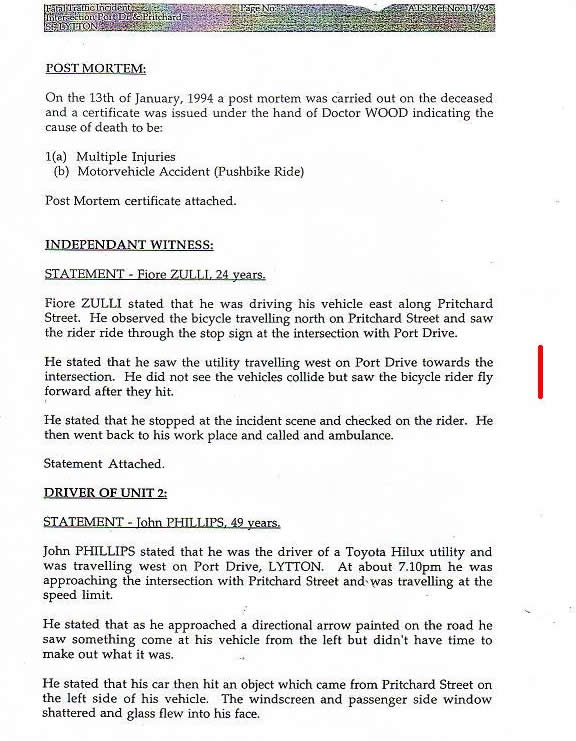
|
Img102 (below) - Sixth Page Coronial Report
Andrew was at my sister’s place (i.e. Margaret Samootin's) for a week prior to when the accident had occurred. Otherwise he lived with me in Sydney. Alexander Kirk is my nephew, i.e. Margaret Samootin's son. There were no stop signs on this main complicated route from Margaret Samootins’ home to Manly. Andrew did not know the area. Alexander Kirk had no money for a telephone call. Every time I queried him about his statement, the story changed. The accident occurred on the unmarked cycling route that Alexander Kirk regularly used in the evenings after he returned home from work.
I was told that Constable Samantha Johnson prepared the statements and then sent them out to various parties to sign and return to her.
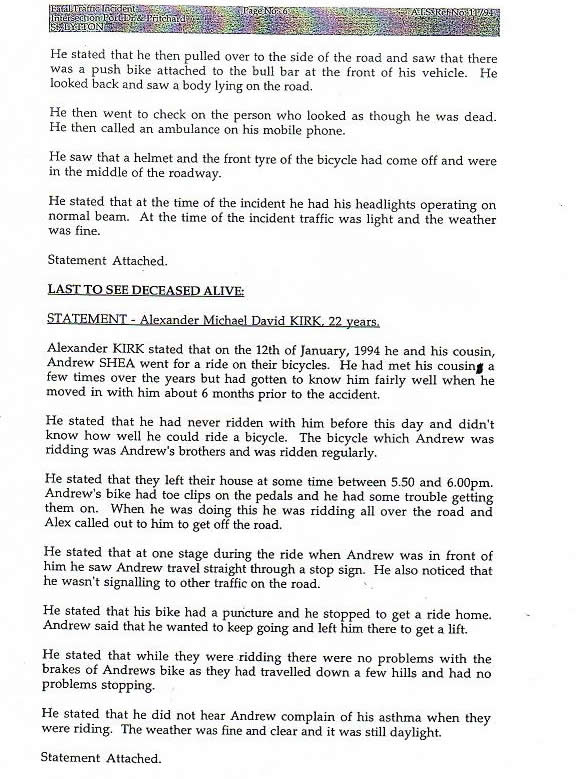
|
Img103 - Seventh Page of Coronial Report - Note: No reconstruction of the accident itself
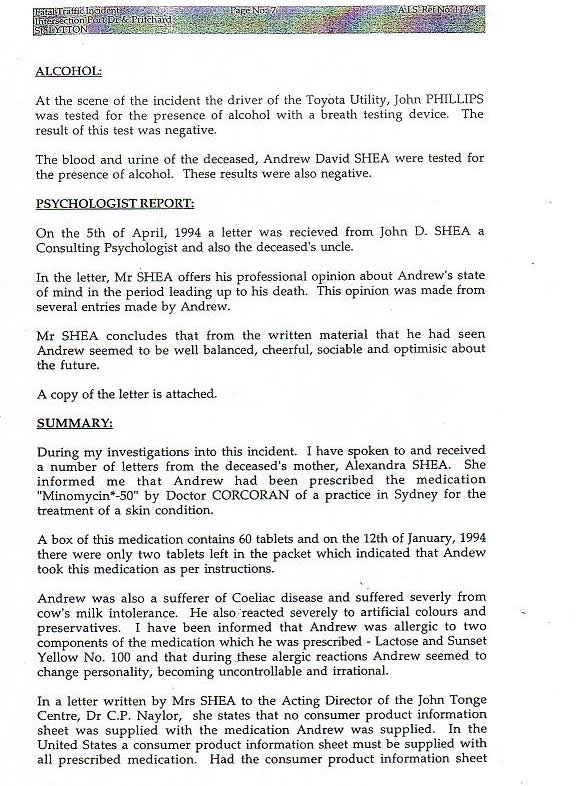
|
Img104 - Eighth Page of Coronial Report
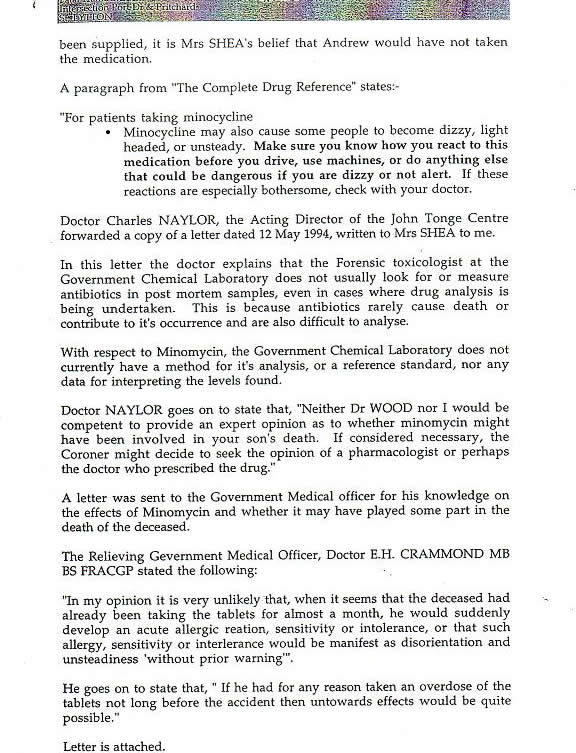
|
Img105 - Ninth Page of Coronial Report
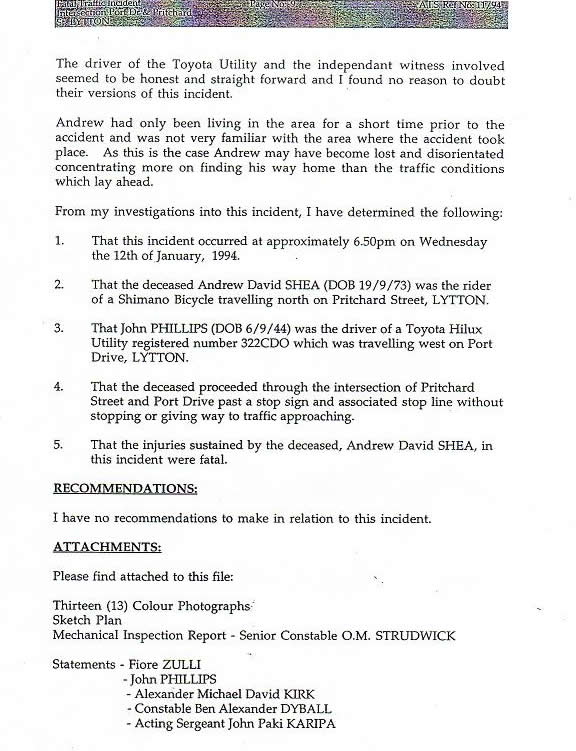
|
Img106 - Tenth Page Coronial Report
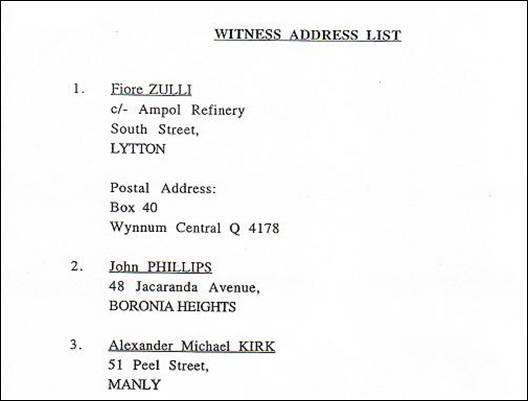
|
Img107 - Eleventh Page of Coronial Report - Unsigned police statement by Fiore Zulli
Fiore Zulli lived at 26 Birdwood Road, Carina, at the time of the accident. His place of abode was in the opposite direction to the accident site. Fiore Zulli was going eastwards to Wynnum at the time of the accident. Fiore Zulli had never lived at Chandler. To get to Chandler one has to go eastwards. There had been no explanation offered as to what Fiore Zulli was doing going eastwards instead of westwards. There is no address listed in the police statement
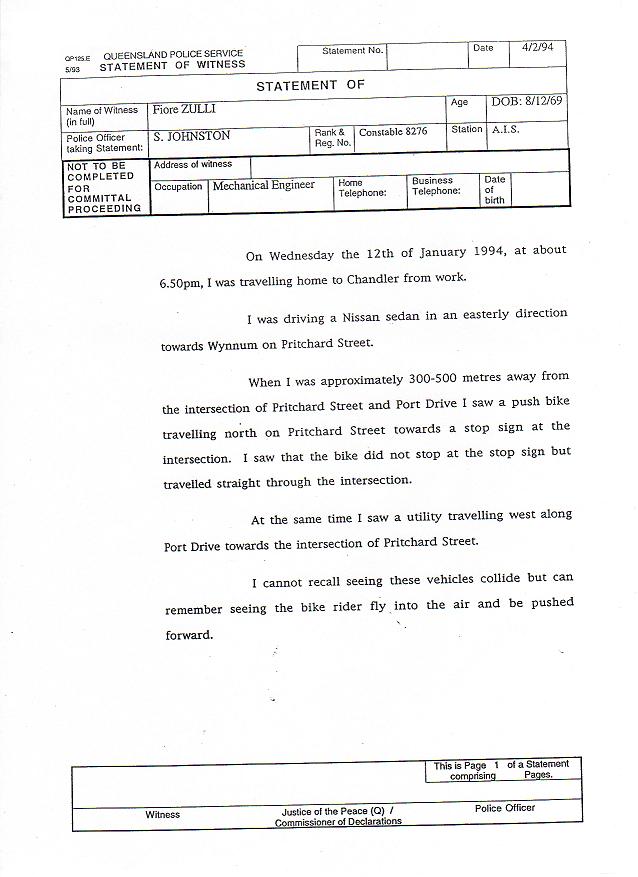
|
Img108 - Twelfth Page of Coronial Report - Second Page of Fiore Zulli's unsigned police statement
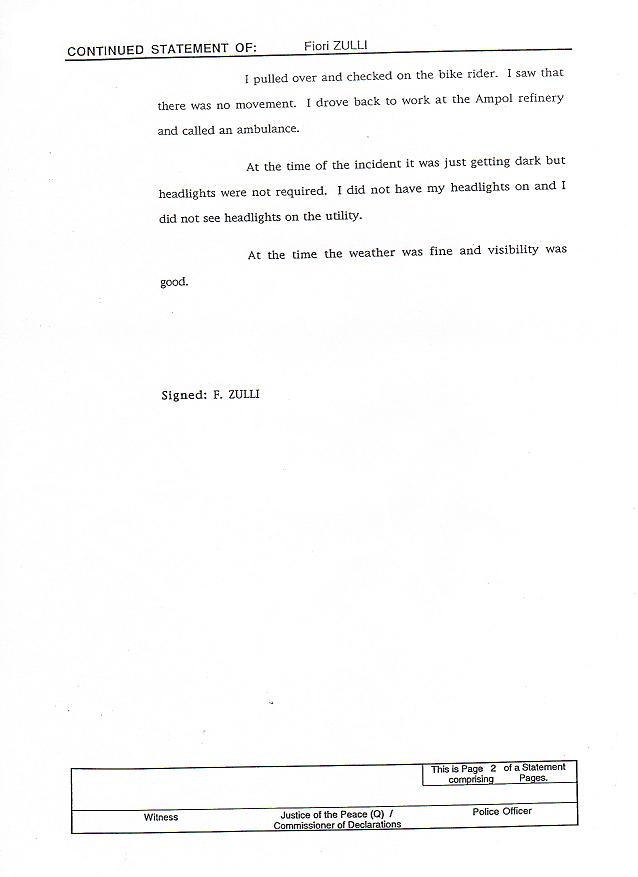
|
Img109 - Thirteenth Page of Coronial Report - Mechanical Report of the collision vehicle
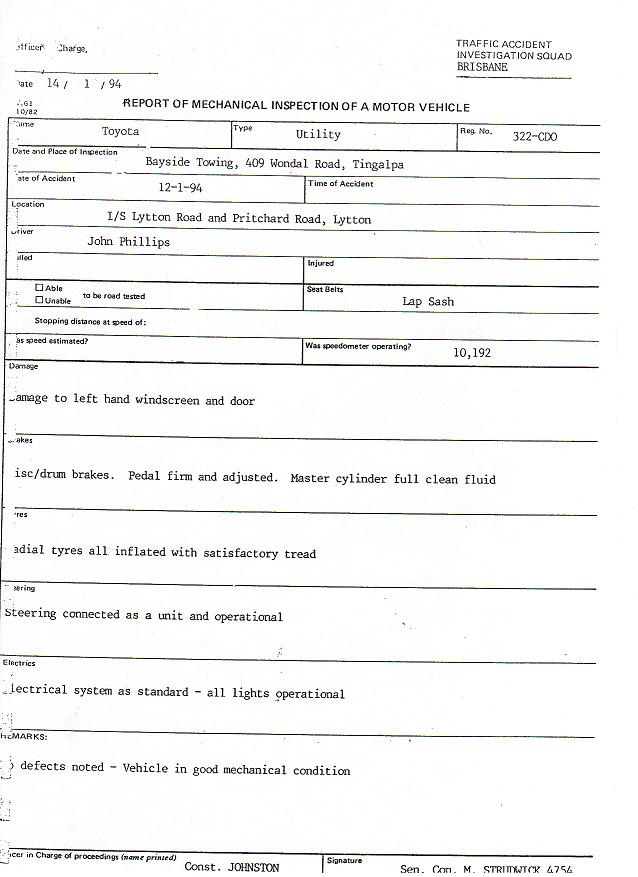
|
Img110 - Fourteenth Page of Coronial Report - Alexander Kirk's police statement
Andrew was at my sister's place for a week before the accident occurred. Andrew did not live with my sister. It was an emergency stop. Andrew had visited his friend at Byron Bay arriving there on Christmas Day 1993. He had planned to return as soon as possible after New Year's Eve 1994. Andrew could not return home as we had bush fires surrounding Sydney. He could not stay at Byron Bay, as his friend's relatives had descended onto the holiday home. As an emergency measure, Andrew travelled north to my sister's place at Manly, near Brisbane, in Queensland. Andrew was an experienced cyclist.
Please refer to Img113, 114 & 115 wherein in this sworn affidavit, my nephew, Alexander Kirk states that he was cycling with Andrew when the accident occurred. Alexander Kirk regularly took the unmarked cycling route to the Port of Brisbane via the intersection at Lytton after he returned home from work
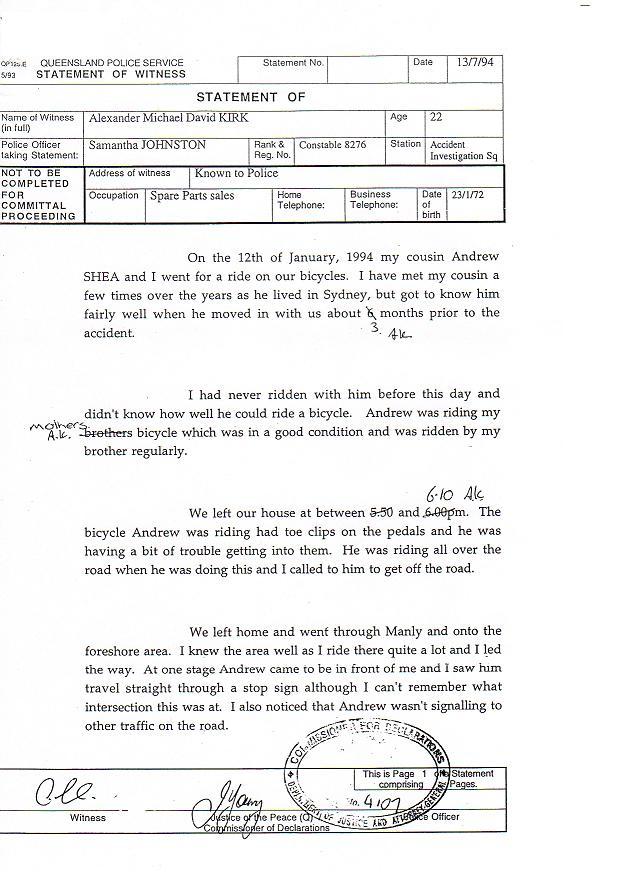
|
Img111 - Fifteenth Page Coronial Statement - 2nd Page of Alexander Kirk's police statement
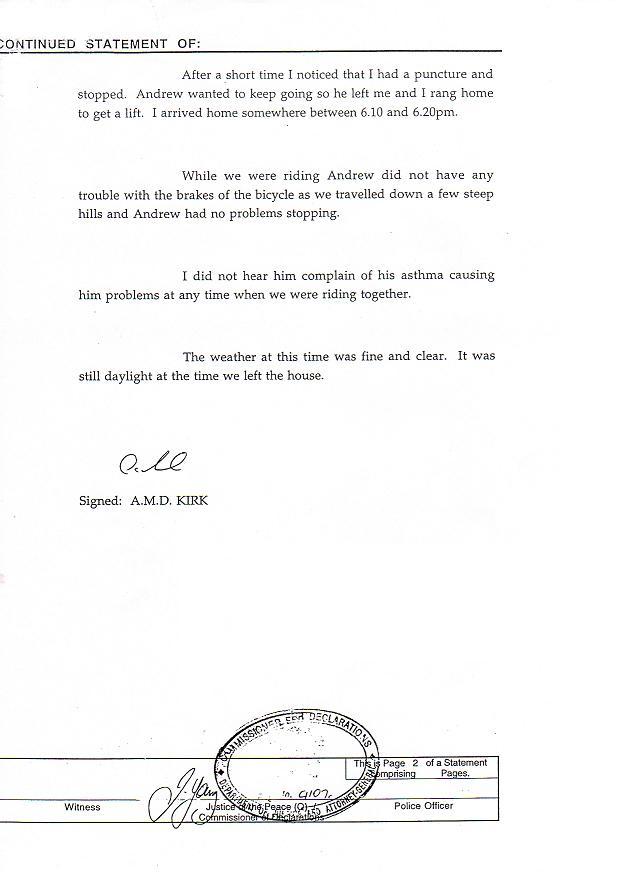
|
Img112 - Seventeenth Page of Coronial Report - Diagram Map - note that there is no point of impact (collision) noted nor path of travel of the vehicle and the bicycle prior to impact and after the impact
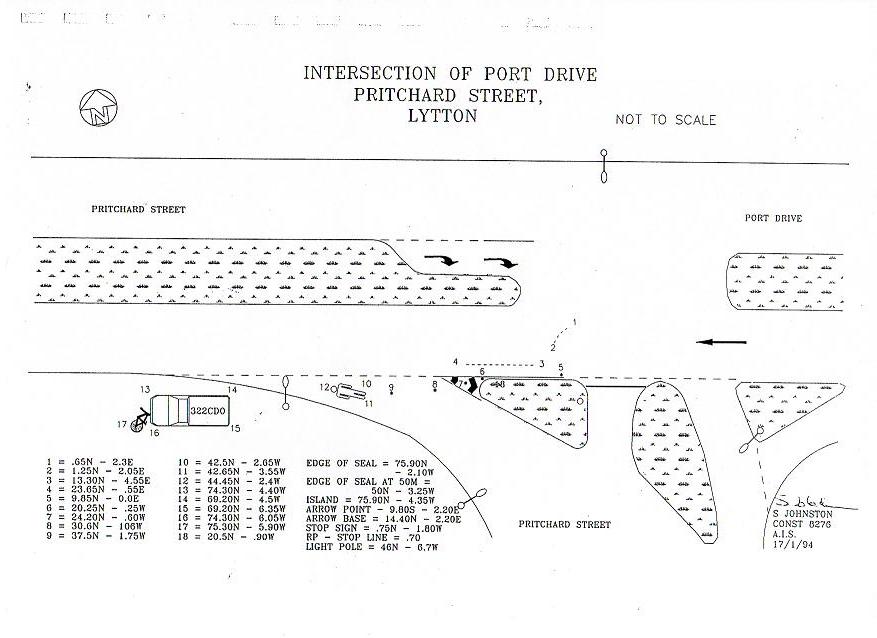
|
Img113 to 115 - Copy of Alexander Kirk's sworn affidavit
Alexander Kirk’s affidavit in which he states that he was cycling with Andrew when the accident occurred. Please refer to Img110 & 111 wherein Alexander states a different story. Evidence shows that Alexander Kirk was cycling with Andrew when the accident occurred. My sister, Margaret Samootin, Alexander Kirk’s mother, was telephoned from the accident site. After the telephone call Margaret Samootin had driven to the accident site with her other son, Douglas Kirk. Douglas and Alexander Kirk then drove back home. Margaret Samootin stayed at the accident site. Margaret Samootin was then taken to the morgue by Constable Dyball. Margaret Samootin then went with Constable Dyball back to Wynnum Police Station
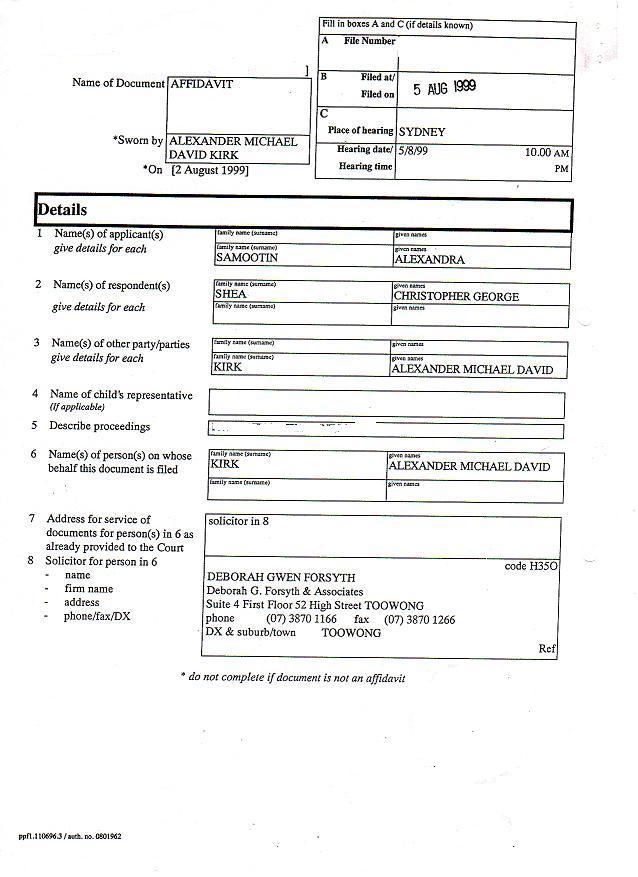
|
Img114 - 2nd Page of Alexander Kirk's affidavit
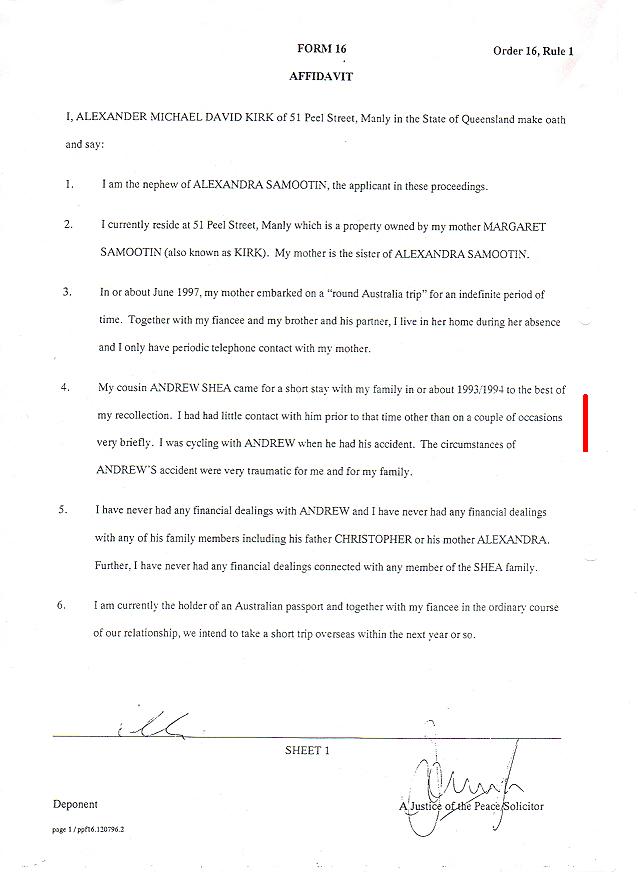
|
Img115 - 3rd Page of Alexander Kirk's affidavit
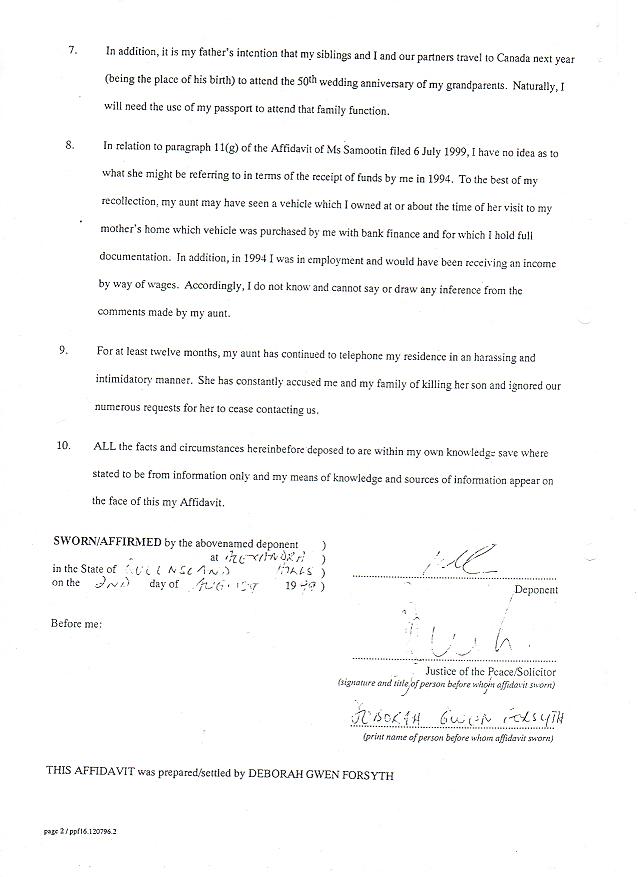
|
Img116 - Query letter to Police Headquarters Communications Department
There are no chain of custody records of Andrew being taken directly from the accident site to the morgue. There was no communications from the police at the accident site to the Police Headquarters Communications Centre for a call out for a morgue vehicle to go to the accident site. Hereunder is the letter that I had sent to the Police Communications Centre, Brisbane, Queensland, with a query as to why there were no records of Andrew being transported directly from the accident site to the morgue. In this letter I had used my former married name. I had been told by the police at the accident site that Andrew was transported directly from the accident site to the morgue. But evidence shows that this was not the case. Andrew had been taken to a destination still unknown to me
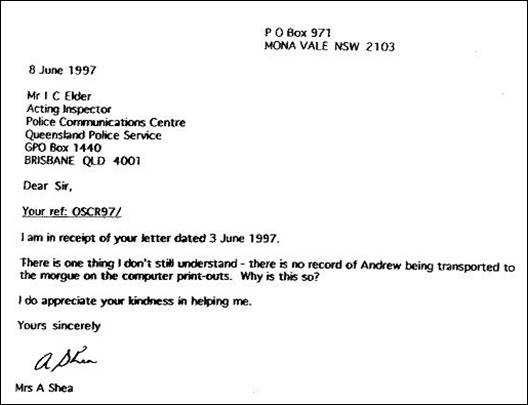
|
Imt117 - Police Communications Department letter of reply
Police Communications letter of reply stated that it is the responsibility of the ambulance for the transportation of the persons involved. There is a strong possibility that Andrew was taken to the local hospital and stabilized and from that hospital transported to the morgue
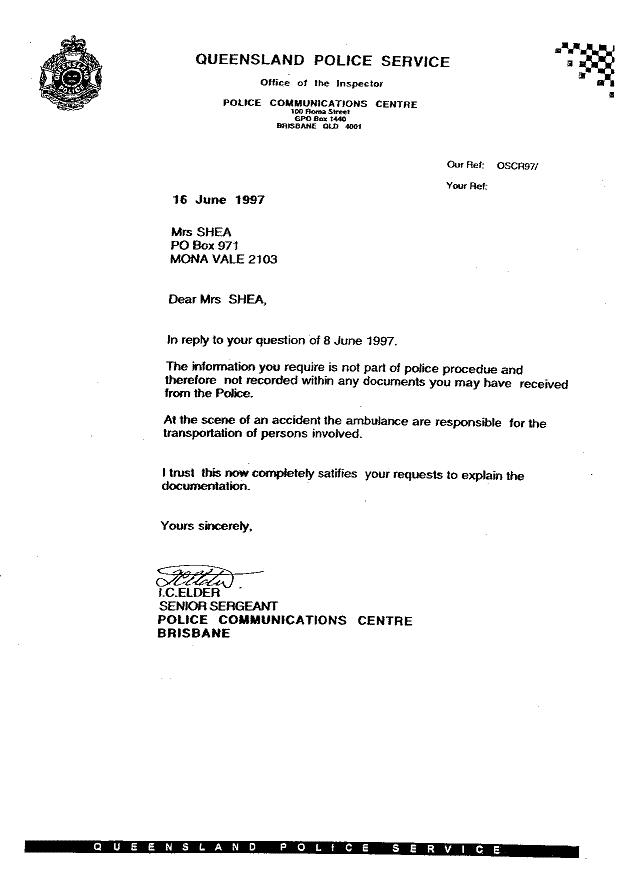
|
Img118 to 122 - Andrew arrived at morgue four hours after the accident
The police claimed that my son was transported directly to the morgue from the accident site, but records show that my son arrived at the morgue at 22.50 hours (10.50pm). Andrew was taken away from the accident site to a destination still unknown to me and from that unknown destination he was taken to the morgue alive. The ambulance officers left the accident site at 7.35pm. Please refer to the call out card for the ambulance for Andrew’s accident
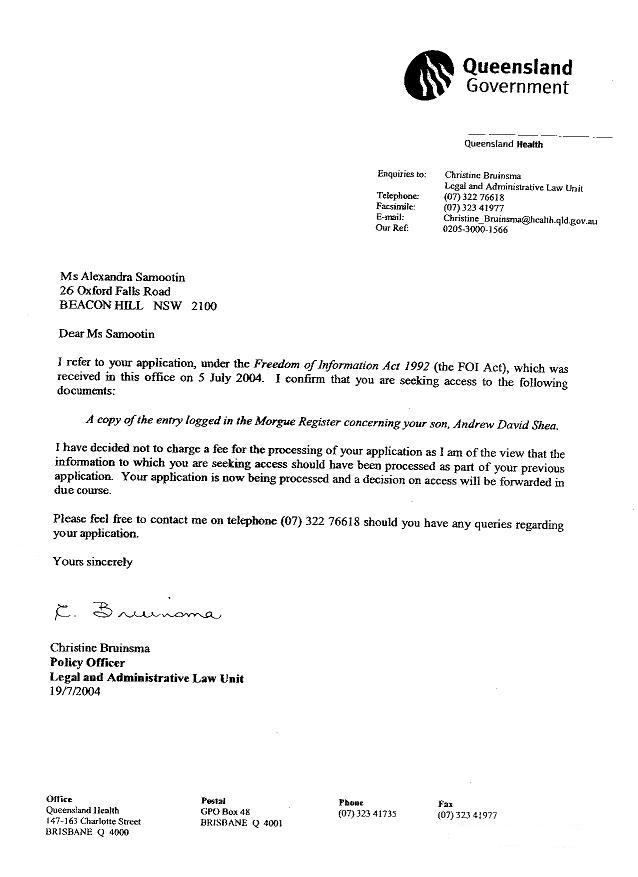
|
Img119 - Extract from Morgue Register - Andrew's arrival time was at 22.50 hours (10.50pm)
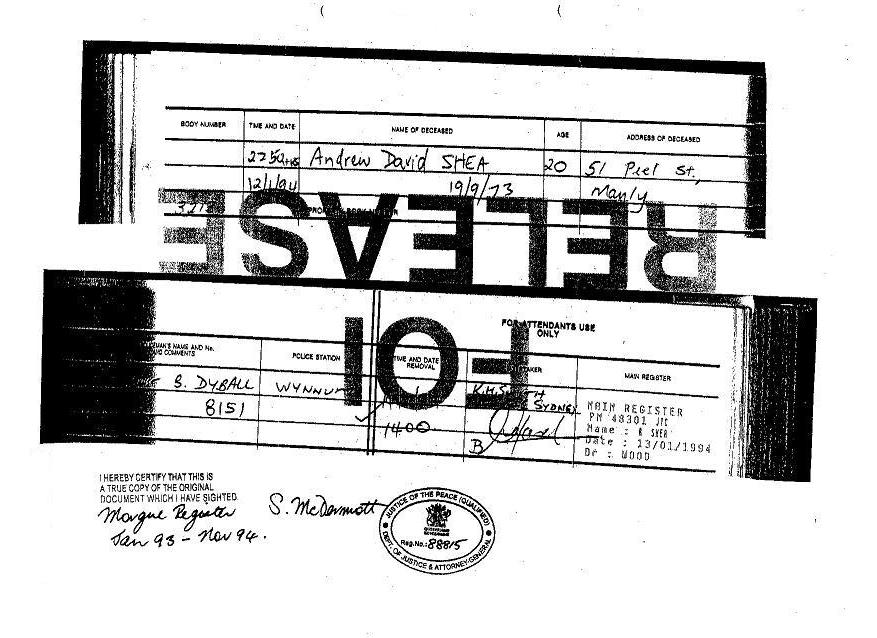
|
Img120 - Explanation by Department of Health regarding the details of the Morgue Register
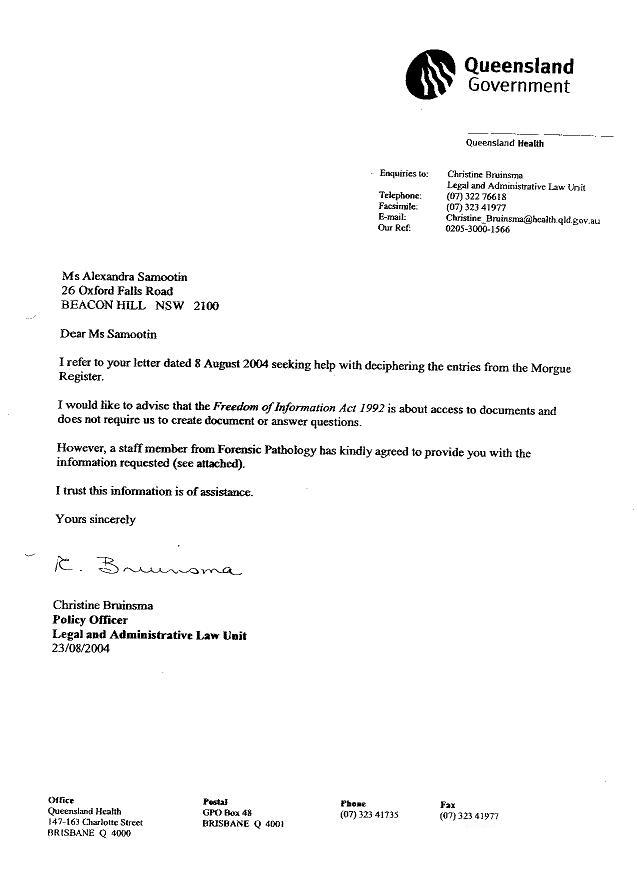
|
Img121 - Attachment to the above letter
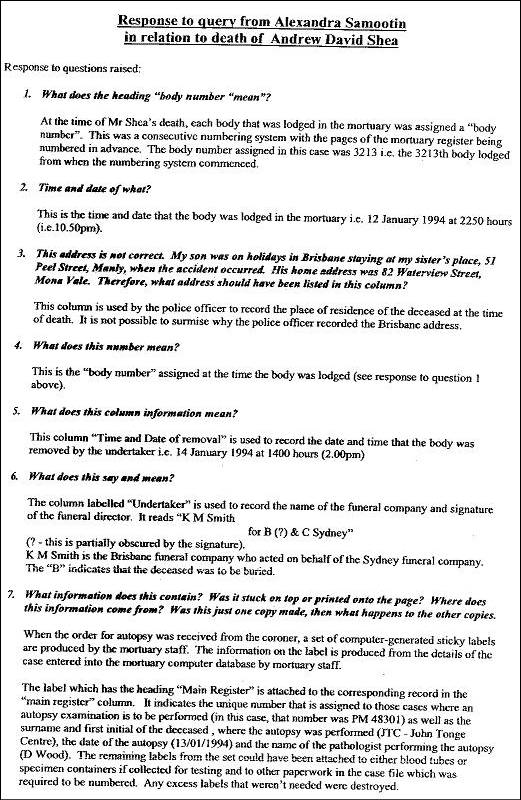
|
Img122 - Letter from Dept of Health confirming that Andrew arrived at the morgue at 10.50pm
When one looks at the police photographs of the accident site, one will note that Andrew is not there. So where was Andrew from the time he was removed from the accident site to the time he arrived at the morgue and what was the means of transport?
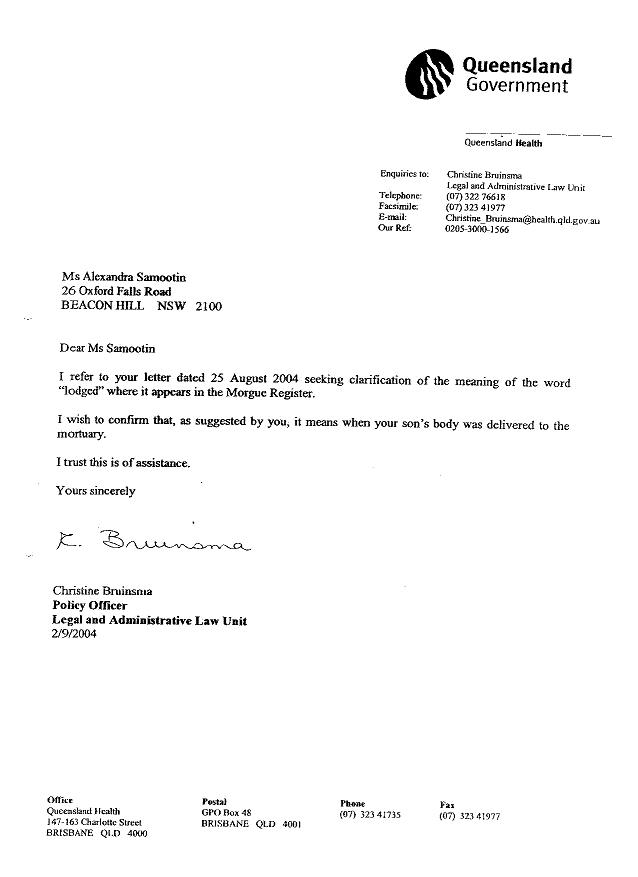
|
Img123 - No record of Andrew being transported directly to the morgue from the accident site
There was no claim form (invoice) submitted by Newhaven Funerals to Department of Justice for the transportation of my son from the accident site to the morgue. Had my son been transported by Newhaven Funerals then Newhaven Funerals would have submitted a claim form (invoice) to the Department of Justice. As can be seen by the Queensland Police Service form “Inventory of Property Taken Possession of by Police Officer from Body at John Tonge Centre” Constable Holly James had signed the form on the line where a person from Newhaven Funerals was supposed to sign. In other words, both Constable Ben Dyball and Constable Holly James knew where my son had been taken after the accident, to the time he arrived at the morgue
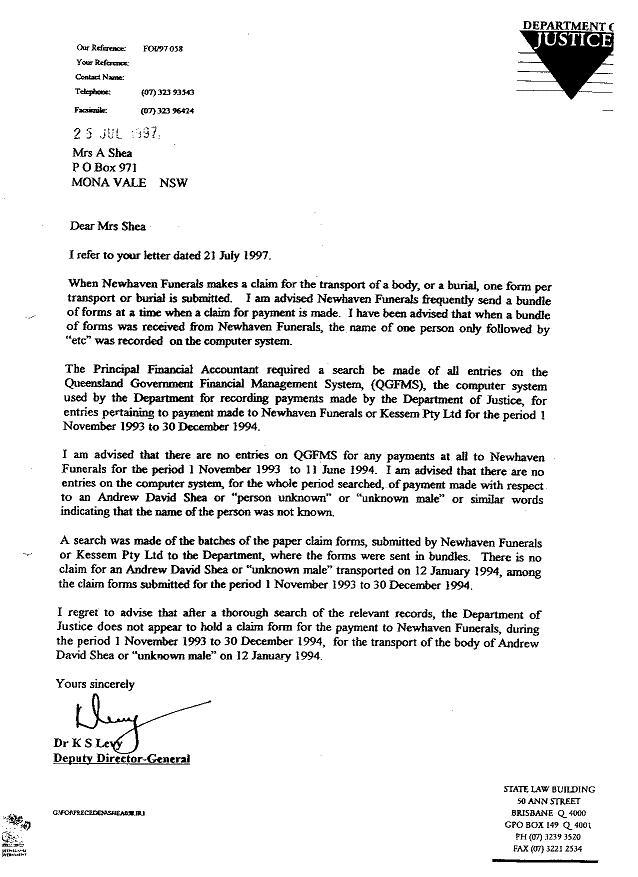
|
Img124 - Queensland Police Service Form 36A
Queensland Police Service Form 36A “Inventory of Property Taken Possession of by Police Officer from Body at John Tonge Mortuary”. You will note that the time of arrival of Andrew at the morgue is 2100 hours (9.00pm). Constable Dyball filled out this form. The signatory is supposed to be “3. The person who conveyed the body is to sign as witness.” Constable Holly James signed the form. The person who conveyed the body listed as “Newhaven Funerals” did not sign as signatory. This is a fraudulent document. Therefore, Newhaven Funerals did not transport Andrew to the Morgue. The question to ask is “How did Constable Holly James transport Andrew to the morgue?”
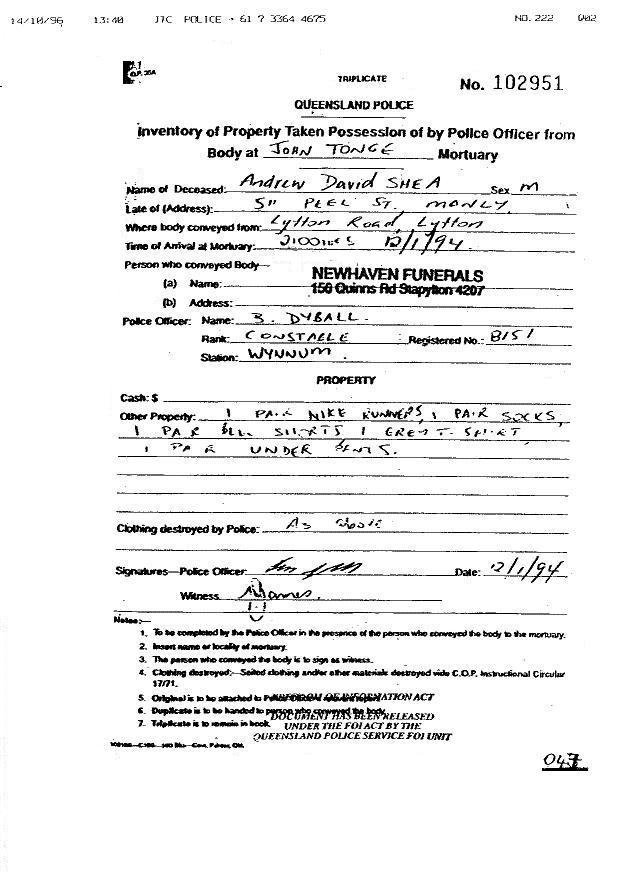
|
Img125 - Police Identification Statement concerning Andrew
Constable Ben Dyball photographed Andrew at the morgue at 22.50 hours (10.50pm) on 12 January 1994. My sister, Margaret Samootin identified my son at 22.45 hours (10.45pm). The time 22.50 hours ties in with the arrival of Andrew at the morgue referencing Img118 to 122
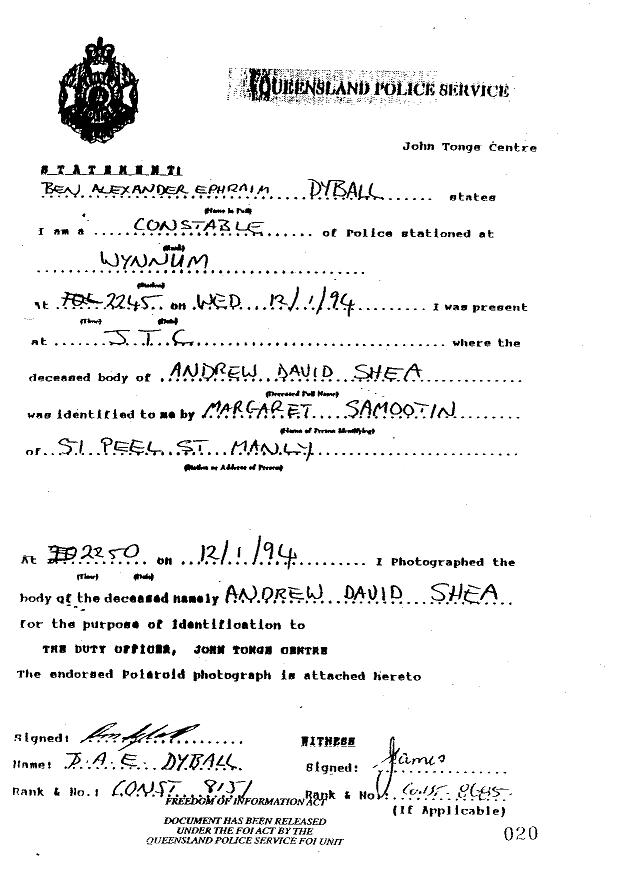
|
Img126 - Copy of police "business" card
This is a copy of the Police "business" Card that I got the day following Andrew’s accident. On the card are the names of the police officers who attended Andrew’s accident that is Ben Dyball and Holly James. Holly James is the police officer who signed the form in Img124 as being the person who conveyed Andrew’s body to the morgue.
On the night of the accident, I had been told by Constable Ben Dyball that he was at the accident site within a minute of it happening. Constable Ben Dyball said words to the effect that they did not know where Andrew went. Dyball said words to the effect that they looked in the swamp area that surrounds the site. Constable Ben Dyball said words to the effect that someone heard moaning from the back tray of the utility. Constable Ben Dyball said words to the effect that Andrew had fallen onto some ladders. Constable Ben Dyball said words to the effect that he, with others, removed Andrew from the back of the utility and placed him on the grassed area next to the utility. Constable Ben Dyball said words to the effect that he waited with Andrew until the ambulance came.
I have been told by a senior Wynnum Police Station police officer that if I was given that information on the night of the accident and then received the police card the day following the accident, then that event did occur. This police officer told me that Fiore Zulli’s statement that my son flew through the air for 45 meters is rather “far fetched”
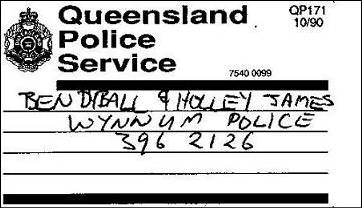
|
Img127 - The police were already at the accident site when the ambulance were called
There are two call-out card attached to this letter. The call-out cards show that the police were not called to the accident site as they were already there when the ambulance 000 emergency number was called at 6.57pm. Otherwise a call from the Department of Emergency Services would have been made and noted on the ambulance call-out cards. This evidence corroborates the scenario that Constable Ben Dyball had told me on the night of the accident - that he was sitting around the corner and was at the accident site within a minute of it happening
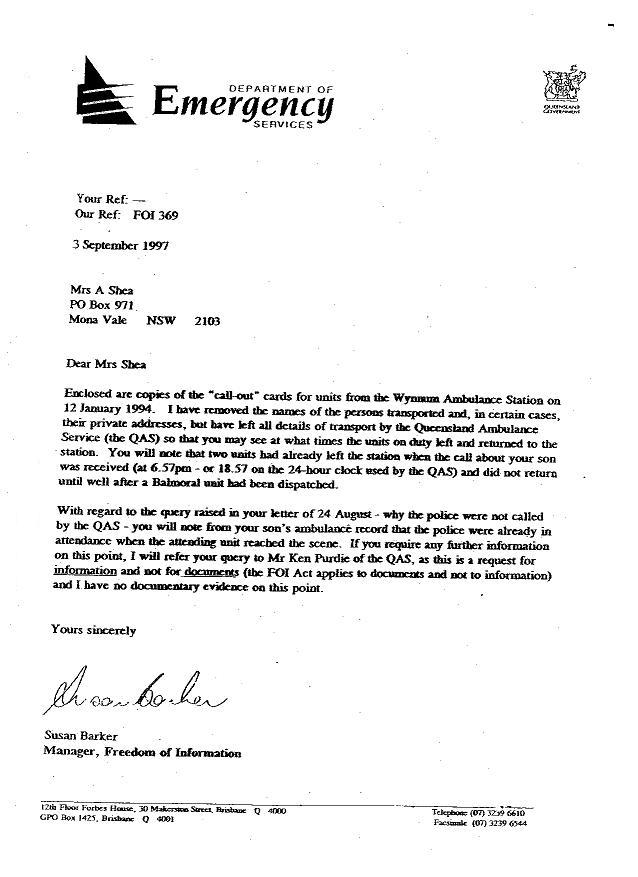
|
Img128 - Ambulance Call-Out Card No.1 - referred to in the previous image
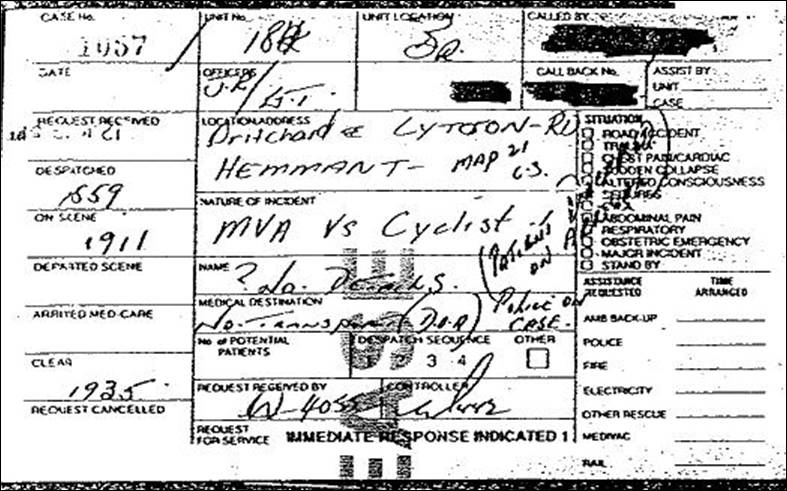
|
Img129 - Ambulance Call-Out Card No.2 - more corroborative evidence that the police were at the scene of the accident site when the ambulance were called
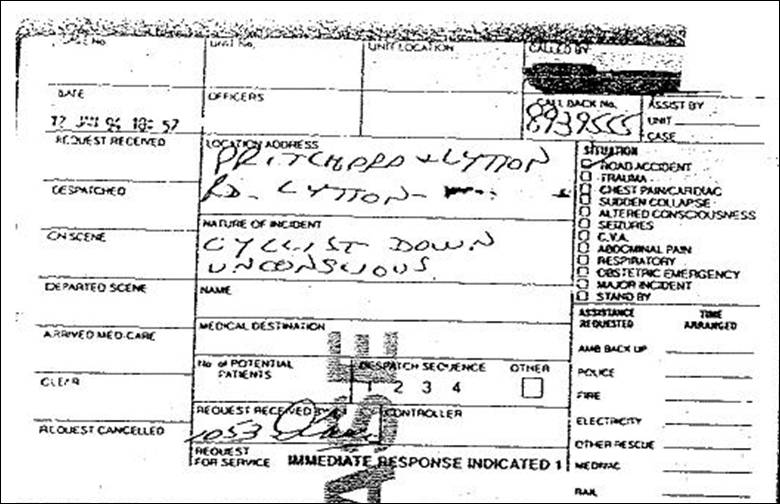
|
Img130 - Letter from Telstra informing me that all Emergency Services had direct lines to each other and it was only necessary to make one call to the 000 emergency number. I wrote the letter using another name and a different post office box number. I had wanted a totally "independent" report type letter
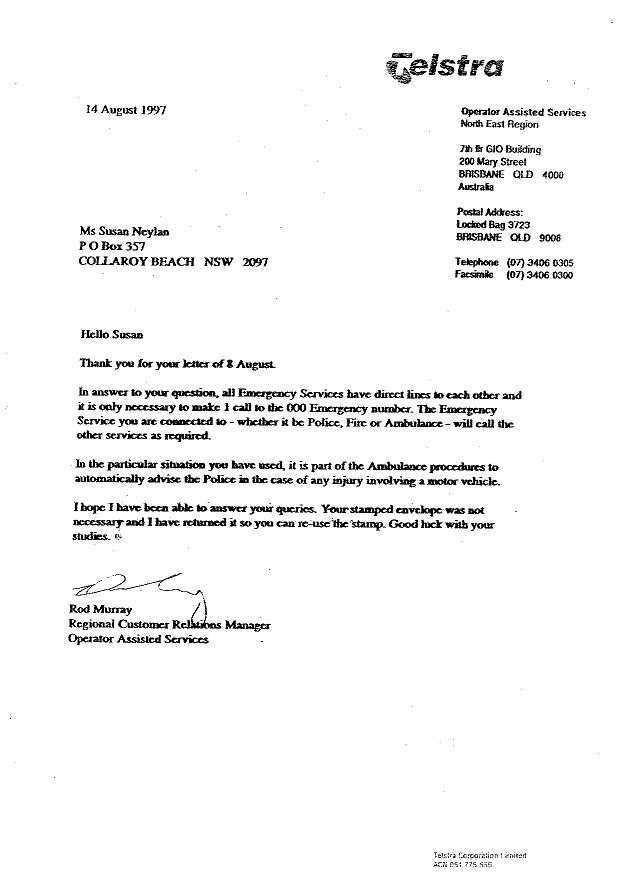
|
Img131 -Constable Ben Dyball's field police notes of the accident site
As can be seen from the notes my sister, Margaret Samootin, was at the accident site and had identified Andrew. Margaret Samootin had told me that when she got called by the police, she emptied Andrew’s wallet into his carry bag and took his Learner Drivers Licence with her (Img134).
Fiore Zulli said to the police on the night of the accident that he saw the “hit”, but the story changed to whereby he stated to Constable Johnson – “I cannot recall seeing these vehicles collide but can remember seeing the bike rider fly into the air and be pushed forward”. Andrew was on a bicycle. He was not in a vehicle.
Note: There is no mention of John Phillip's details in Constable Ben Dyball's police notebook. John Phillips was the driver of the vehicle involved in the collision
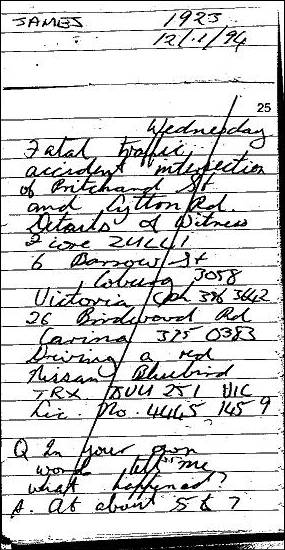
|
Img132 - Page 2 of Constable Ben Dyball's police notes
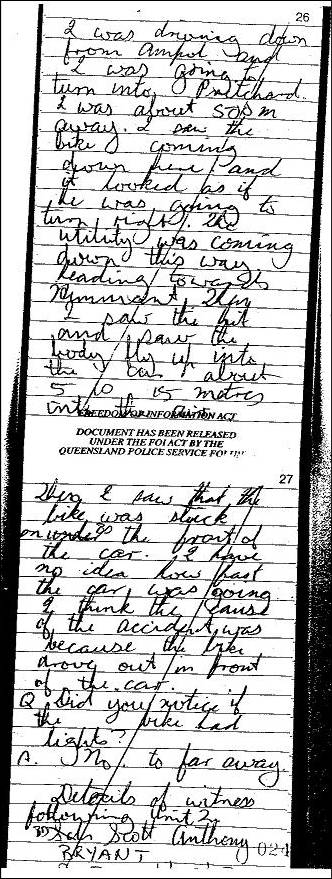
|
Img133 - Page 3 of Constable Ben Dyball's police notes
As can be seen by Constable Ben Dyball’s police field notes Andrew was identified at accident site by my sister, Margaret Samootin. Andrew’s Learner Driver’s Licence was used for identification purposes. Margaret Samootin told me that the police had wanted a driver’s license. Margaret took Andrew’s Learner Driver’s License with her
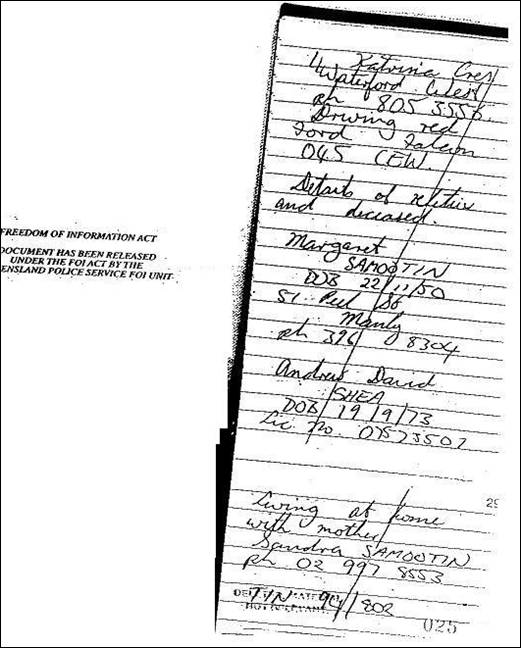
|
Img134 - Copy of Andrew's Learner Driver's Licence that Margaret Samootin took to the scene of the accident. At a later date Margaret Samootin gave it to me
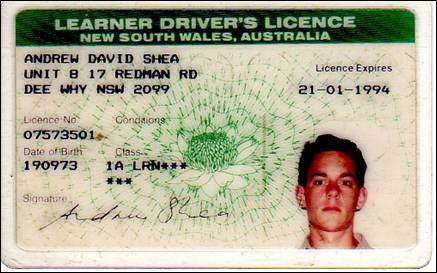
|
Img135 - Witness Scott Anthony Bryant did not own a vehicle at the time of Andrew's accident
Scott Anthony Bryant did not own any vehicles at the time of the accident. Constable Ben Dyball wrote in his notes that Scott Anthony Bryant was following John Phillips (Img132 & 133) in a red Ford Falcon Registration No. 045CEW. At the hearing Scot Anthony Bryant tried to make out that he was driving his own vehicle. I got suspicious about Scot Anthony Bryant as he could not give details of the vehicle. Scot Anthony Bryant had claimed that he had owned two vehicles at the time of the accident
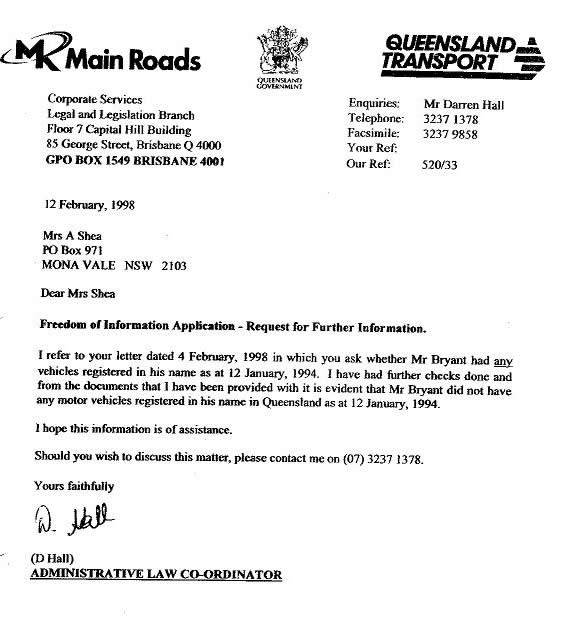
|
Img136 - Another person owned the car that Scott Anthony Bryant had claimed he owned
Joseph Wills owned the red Ford Falcon Registration 045CEW that was traveling behind the utility involved in the collision. I called in on Joseph Wills at his home on 12 February 2004, at 130 Macarthy Road, Marsden.
Joseph Wills wrote his name on the top of the letter and his telephone numbers. Joseph Wills told me that the intersection where Andrew had the accident is a well known drag racing spot. Joseph Wills pointed out the white mark on the road made by the drag racers as a start off point for whatever. Joseph Wills told me that “they” won’t talk as they will get into trouble with the police for drag racing.
I recalled that prior to going to Brisbane in April 1994 I had telephoned Constable Samantha Johnson and told her I was going to view the accident site during the Easter weekend. Constable Samantha Johnson told me that the white marks on the road were the paint marks made by the kids who were drag racing before the accident occurred. Constable Samantha Johnson told me that the yellow marks were the police mark
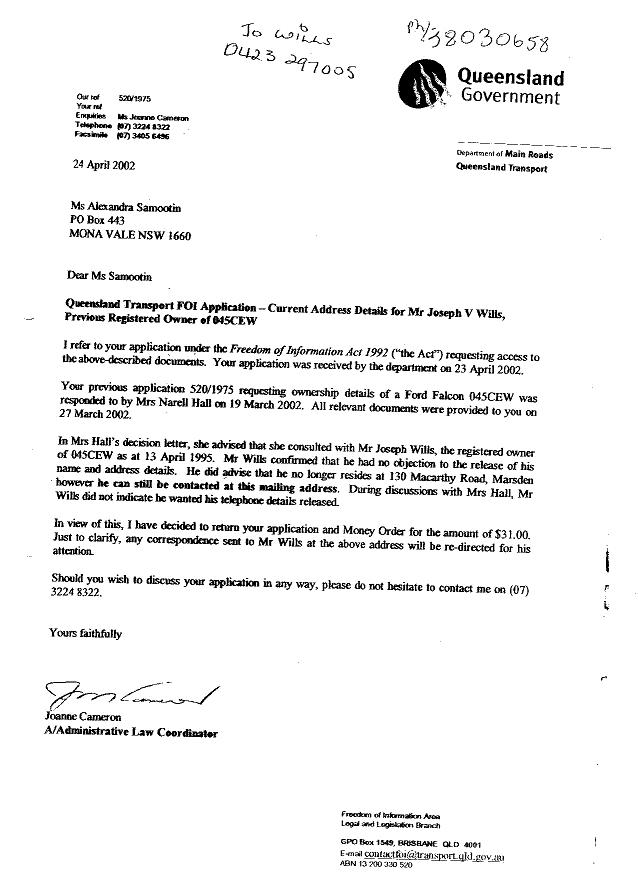
|
Img137 - An extract of the Police Communications' record
The police were already at the accident site when the ambulance were called (refer Img127). At 19.01 hours (7.01pm) the driver of the utility, Phillips, called the police. Information was then given to Police Communications Centre as if Constable Ben Dyball was proceeding to the accident site. In the vicinity of the accident site, there was a Peter Owens who had worked for the Police Communications Centre, Brisbane, Queensland. A Ted Richardson came to Andrew’s funeral in Sydney. I saw him standing at the back of the church. I still do not know how Ted Richardson got the details of Andrew and his funeral. At a later date my sister, Margaret Samootin, gave me his name. Ted Richardson is the person who has been to “numerous inquests”. I got a statement from Ted Richardson. He said that he saw a cyclist travelling down Port Road towards the intersection just prior to learning of Andrew's accident from Peter Owens. Ted Richardson lived at 7 State Street Hemmant. He was 43 years old at 28 August 1996. He listed his occupation as “Pastoral Assistant”. His wife’s name is Marcia. I do not know who pays Ted Richardson. He does not have any specific job
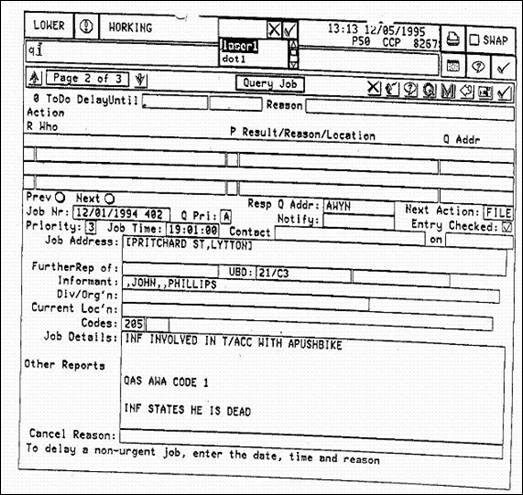
|
Img138 - Letter from the Queensland Police Service re translation of comunications records
I sent a letter to the Queensland Police Communications Branch seeking an explanation of the Communication records that were forwarded to me. As can be seen by the notes, even though evidence shows that Constable Ben Dyball was at the accident site when the ambulance call was made at 6.57pm, Constable Ben Dyball then made out that he was proceeding to the accident site at 19.17 hours (7.17pm). Constable Ben Dyball is in car W201
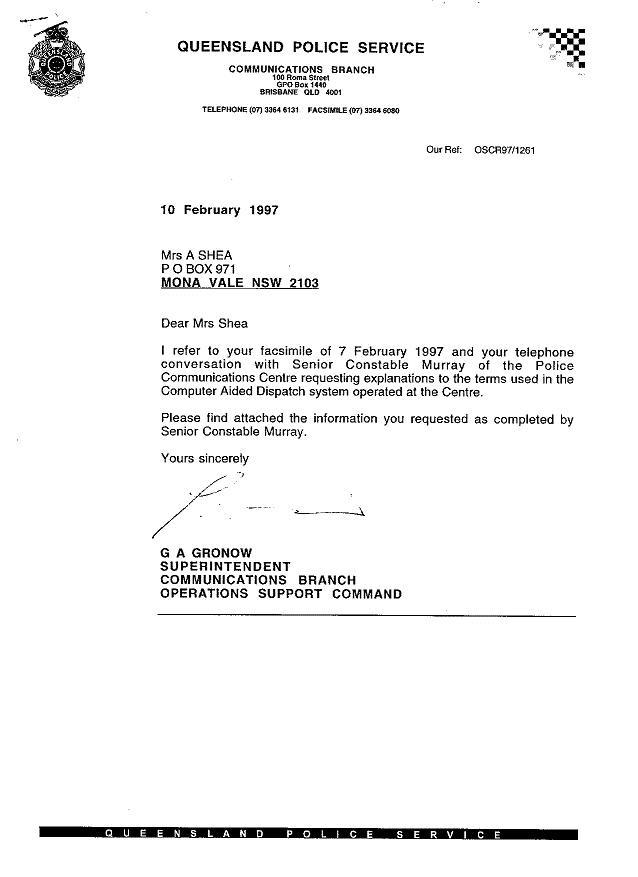
|
Img139 - Continuation of the letter in the previous image
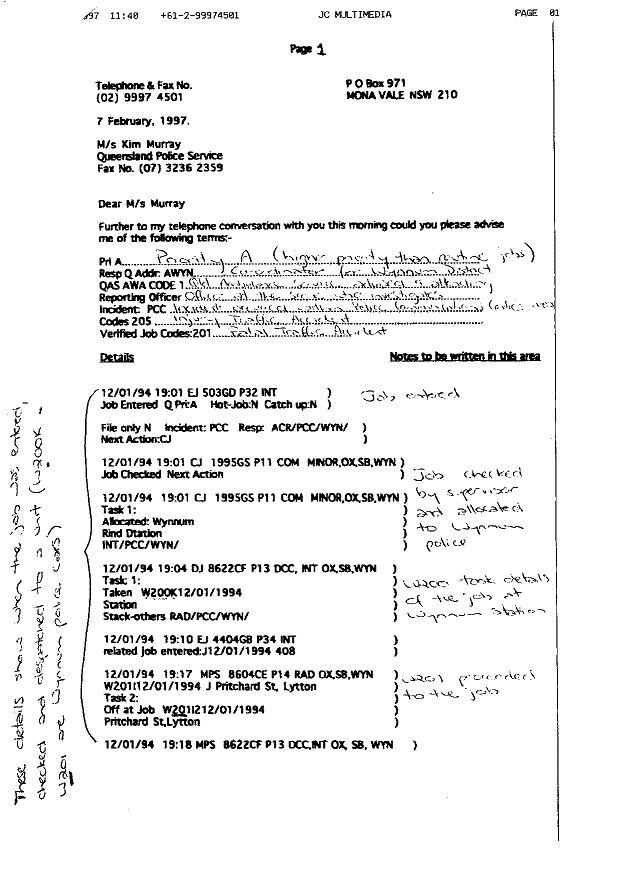
|
Img140 - 3rd page from the letter mentioned above
Constable Ben Dyball was the intersection at 19.18 hours (7.18pm). Then at 21.50 hours (9.50pm) Constable Ben Dyball booked back on air. That is a difference of a time space of 2 hours and thirty minutes that has not been accounted for.
At 21.59 (9.59pm) Constable Ben Dyball proceeded to the John Tonge Centre (the morgue at Coopers Plains). At 22.19 hours (10.19pm) Constable Ben Dyball arrived at the morgue. The time of travel to the morgue took twenty minutes. Then Constable Ben Dyball and my sister waited for Andrew to arrive at the morgue at 22.50 hours (10.50pm). In Constable Ben Dyball's presence Andrew was identified by Margaret Samootin at 10.45pm. Constable Ben Dyball then took the identification photograph at 10.50pm. At the hearing Constable Ben Dyball said that “we” had cleaned Andrew’s face. So the question to ask is “Where did Constable Ben Dyball go to prior to booking back on air at 21.59 hours?”
Constable Ben Dyball had claimed that he had picked my sister at her place of residence at Manly. Records show that he could not have picked my sister up at her place. Constable Ben Dyball must have really put his foot down on the pedal to get to the morgue in twenty minutes from the accident site. I took the route a few times on a Sunday morning, i.e. the accident site at Lytton to the morgue at Middle Street, Coopers Plains. It took me about thirty-five minutes each way
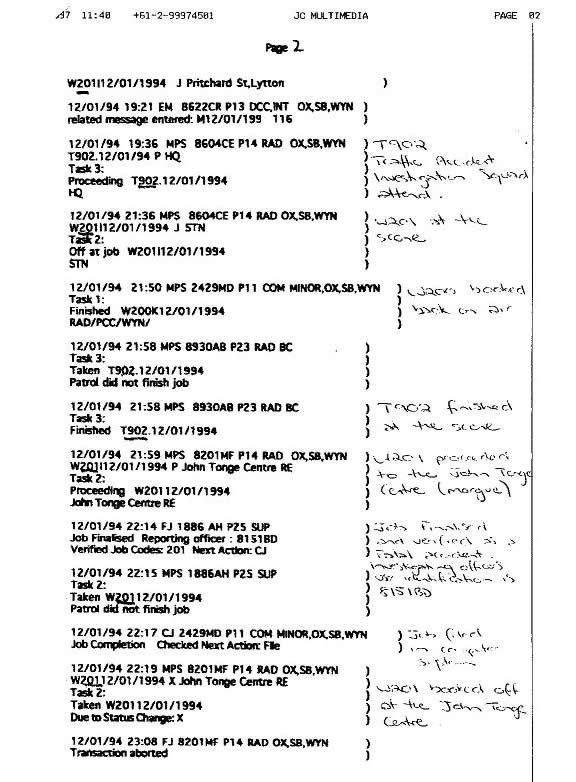
|
Img141 - Fourth page of the letter referred to above
At 23.08 hours (11.08pm) Constable Ben Dyball did not finish the job. At 23.30 (11.30pm) Constable Ben Dyball finished the job. Presumably he had returned to Wynnum Police Station
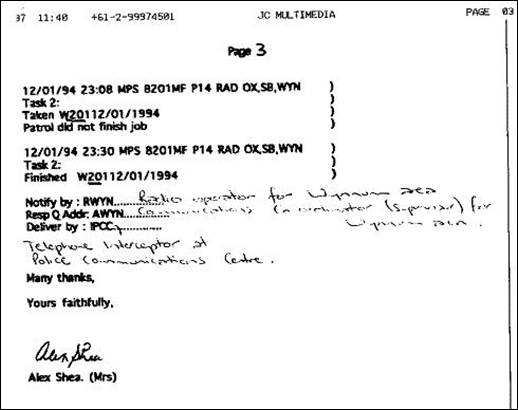
|
Img142 - Extract from the Queensland Police Service Traffic Accident Investigation Law & Procedure Manual
It is stated that the location of the place of impact can be ascertained by the gouge marks on the road surface, glass or other objects collected together and blood areas on certain occasions, e.g. in Andrew’s accident the grassed area of the traffic island. This is the manual that was in issue when Constable Samantha Johnson and Sergeant John Ruller carried out their investigation into Andrew’s accident
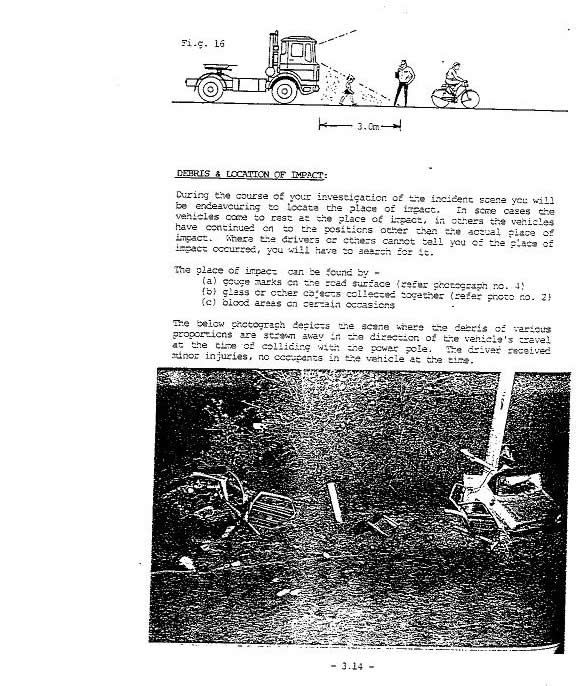
|
Img143 - Extract from Police Manual - details as to the path of travel of damaged vehicles ascertained by gouge and scratch marks on the road, i.e. two sets of gouge and scratch marks depicted
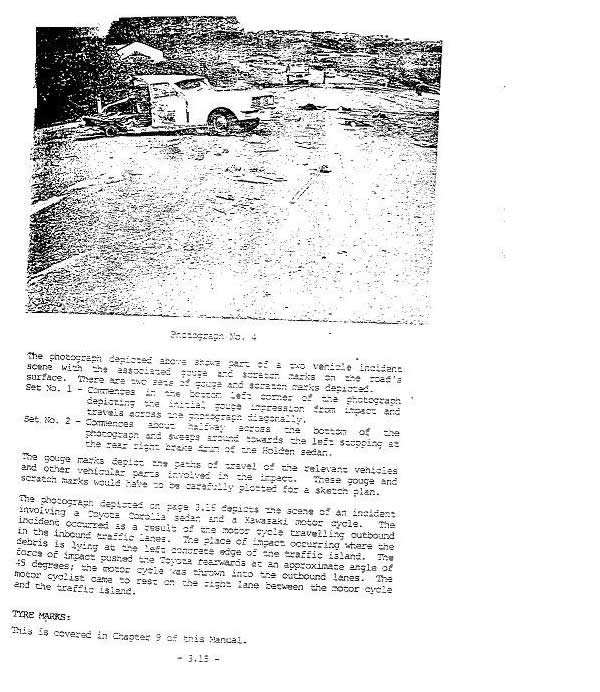
|
Img144 - Extract from Police Manual - continuation of the previous page 3.15
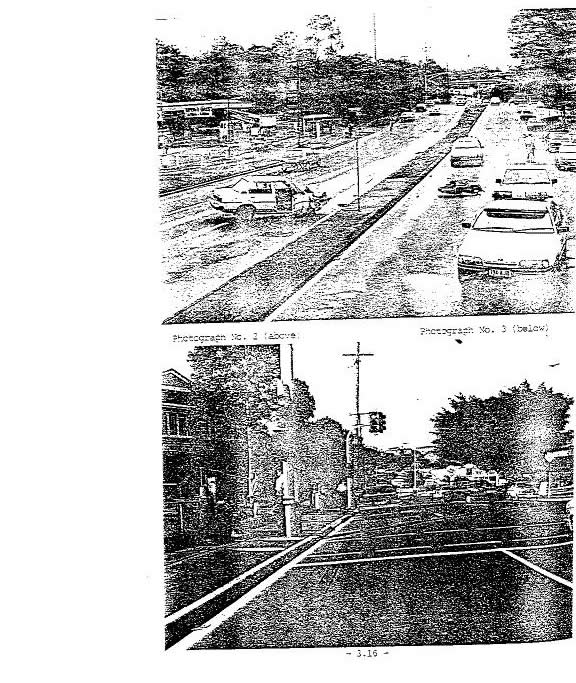
|
Img145 - Extract from Police Manual - According to the police manual Constable Johnson and Sergeant Ruller should have taken photographs of the relationship between the vehicles, damaged property or injured or deceased persons; debris of the accident; four sides of the vehicle involved in the accident; and the path of the respective vehicles. This did not occur. In fact the rear of the utility involved in the accident was concealed by the red Ford Falcon 045CEW. The other vehicle/s involved in the collision were removed and not photographed. The omission of not photographing all the evidence is concealment of evidence
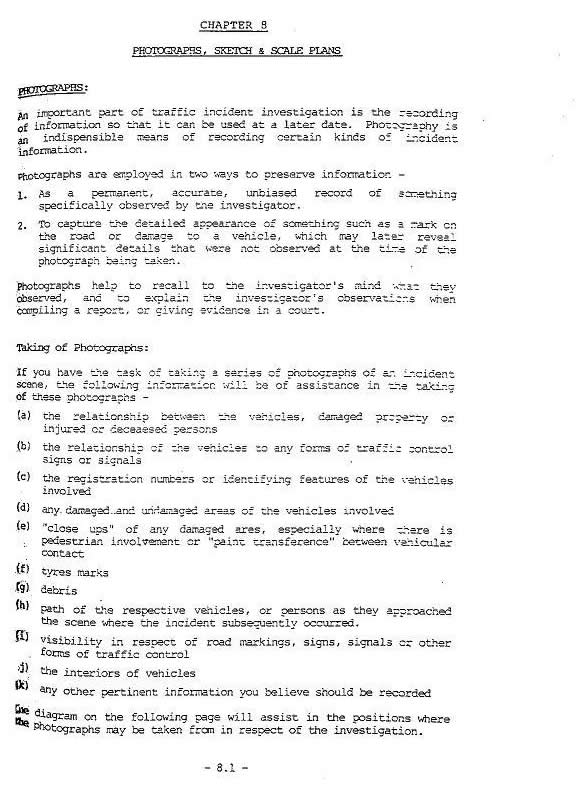
|
Img146 - Extract from Police Manual - below is a diagram of the photographic shots that should have been taken by Constable Samantha Johnson and Sergeant John Ruller. This includes taking photographs of the four sides of the utility that was involved in the collision
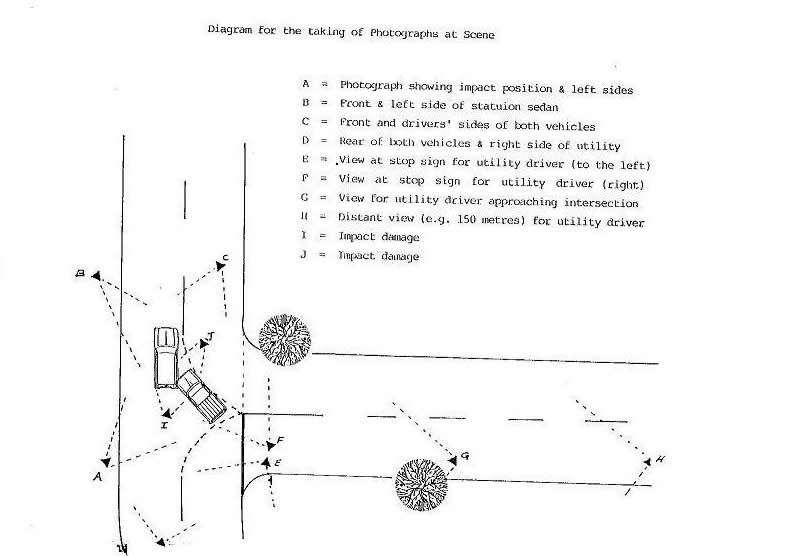
|
Img147 - Extract from Police Manual - According to the police manual Constable Samantha Johnson should have marked the debris from the accident onto her sketch plan. She did not do this. In other words, she concealed evidence
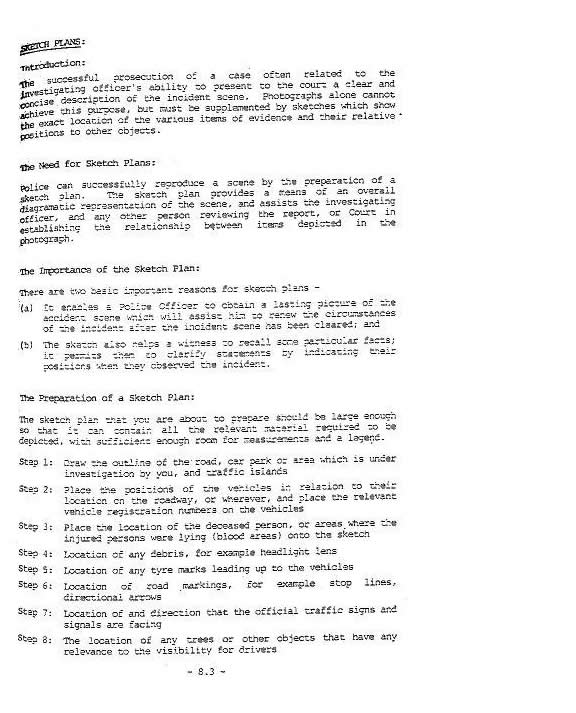
|
Img148 - Extract from Police Manual - Continuation of the police manual relating to the requirements of the sketch plan
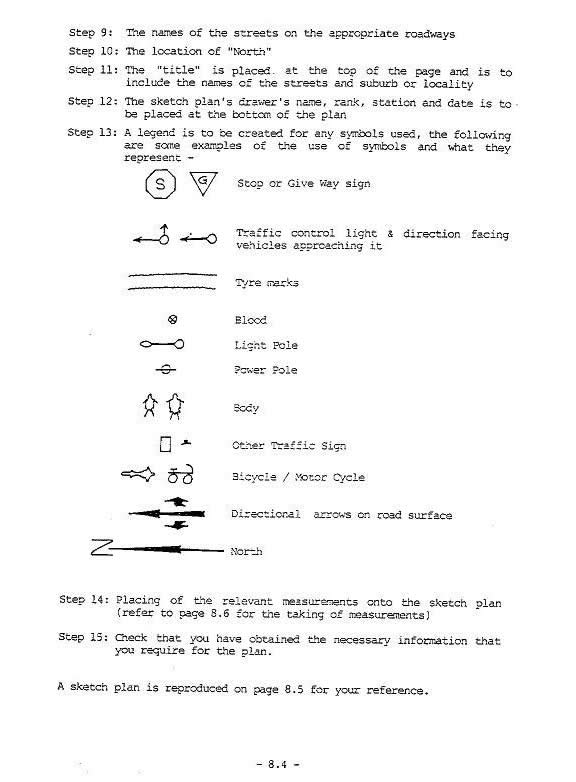
|
Img149 - Extract from Police Manual -
This is what Constable Samantha Johnson’s sketch plan should have looked like. Note the tire marks from the centre point of the collision in the middle of the intersection and the path of travel noted of the vehicles noted on the sketch plan
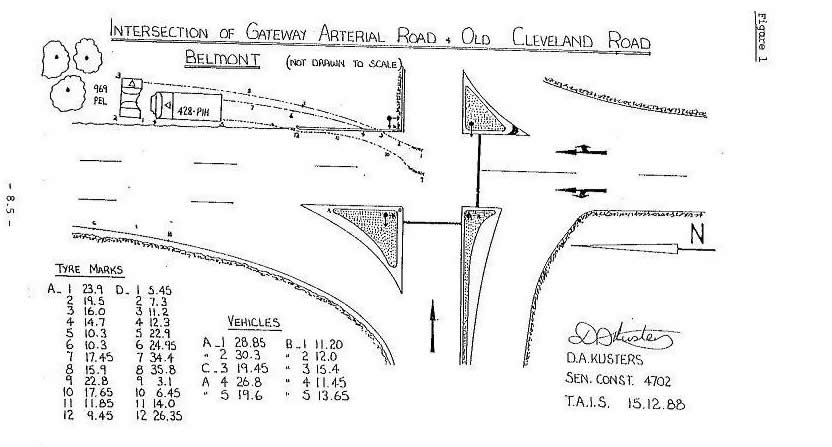
|
Img150 to Img154 have not been included. They refer to details of how brake marks on road surfaces should be detailed
|
Img155 - Extract from Police Manual - Continuation of Img154 above. Details of what should go on the scale plan. Johnson did not do this – refer to the heading of “Maps” Img046. Below is page 8.11
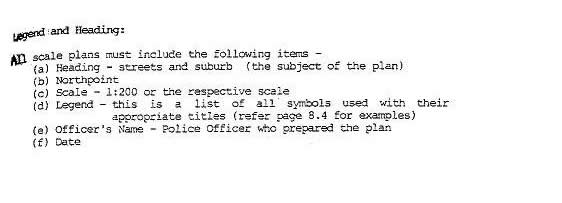
|
Img156 - Extract from Police Manual - re tire marks and effects of irregular braking. Note the comments of how a tire print looks on a soft surface, e.g. a grass surface and look at the photographs of the accident scene Img003 and Img004
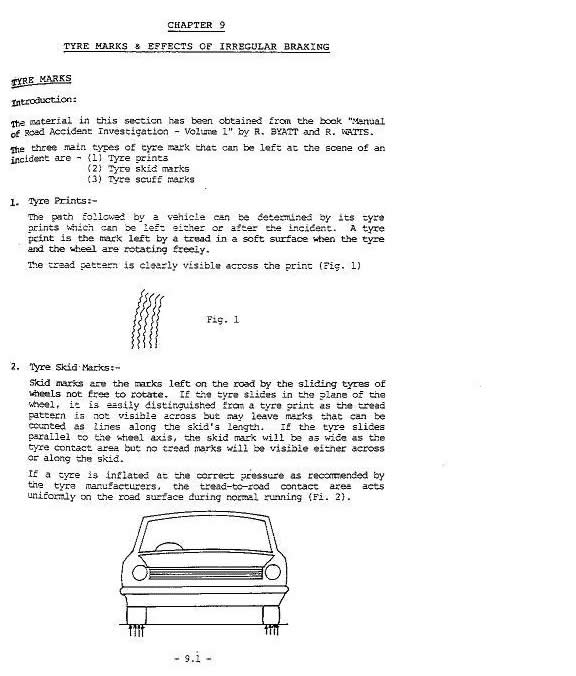
|
Img157 - Extract from Police Manual - continuation of the previous image
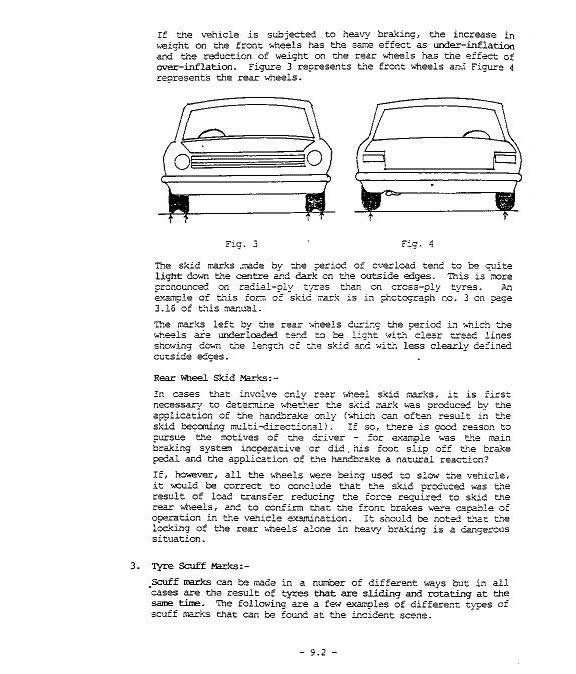
|
Img158 - continuation of the previous image
Putting together Fiore Zulli’s spoken word to me by telephone regarding Andrew’s accident that he saw the driver of the vehicle, John Phillips, swerve to the left and to the left again past the intersection, and the evidence that John Phillips had mounted the curb of the traffic island as per Img002, 003 and 010 under the heading of “Photographs”, I drew in pencil in Fig 8 below, the serve of the vehicle and the curb’s edge so as one can get the impression of how the short sharp horizontal mark had appeared on the utility’s left front wheel as in Img010 the same height as the curb’s edge as portrayed in Img037. Sergeant John Ruller, Traffic Investigation Squad, Queensland Police Service, said in his testimony that there should be short sharp marks left on the curb consistent with the vehicle mounting the curb.
In Img005 & 006 one can see skid marks swerving to the left in the background close by to the utility involved in the collision in the same manner as illustrated below in the photograph at the bottom of this page. At Andrew’s accident this is the point where the tow truck had towed away from the accident site the other vehicle involved in the collision
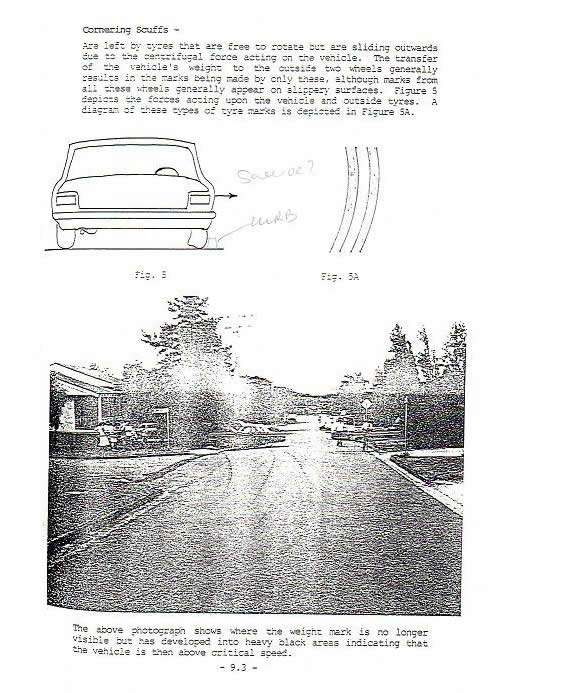
|
Img159 - Extract from Police Manual - continuation of the previous image
When one views Img003 under the heading of “Photographs”, in the foreground one can see a similar mark on the road as depicted under the heading of “Collision Scuffs” below. That is a vehicle that was traveling behind the utility involved in the collision had swerved to the right. You will note that in Img006 the rear of the utility is hidden by a vehicle parked behind it. Sergeant John Ruller should have photographed the four sides of the utility as per the police manual. Sergeant John Ruller concealed evidence in not photographing the full rear end of the utility and all the sides of the utility
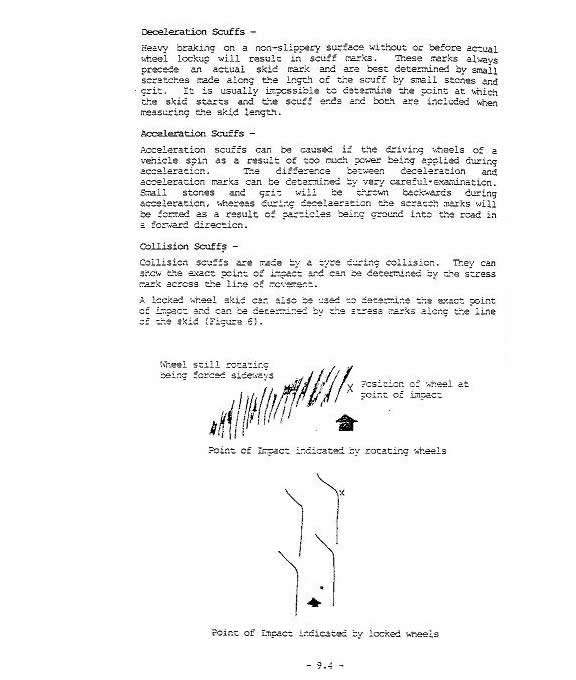
|
Img160 - Extract from Police Manual - continuation of the previous image
Note: In the first paragraph - "The marks, however, show how far the car slid and, from this, how fast the vehicle would have to have entered the skid to stop in that distance."
Constable Samantha Johnson and Sergeant John Ruller did not apply this forensic science to the skid mark on the road in relation to Andrew’s accident. In other words Sergeant John Ruller and Constable Samantha Johnson concealed evidence in not providing a full and frank disclosure as to the speed of the vehicle at the time of the collision, i.e. between 40 and 50 klms
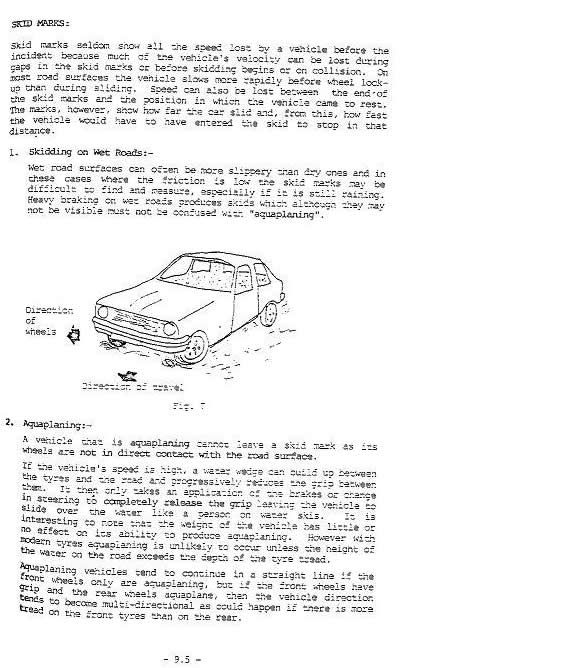
|
Img161 - Extract from Police Manual - more data about skid marks - Note: More than one single skid mark on the road referred to in the manual in relation to a vehicle
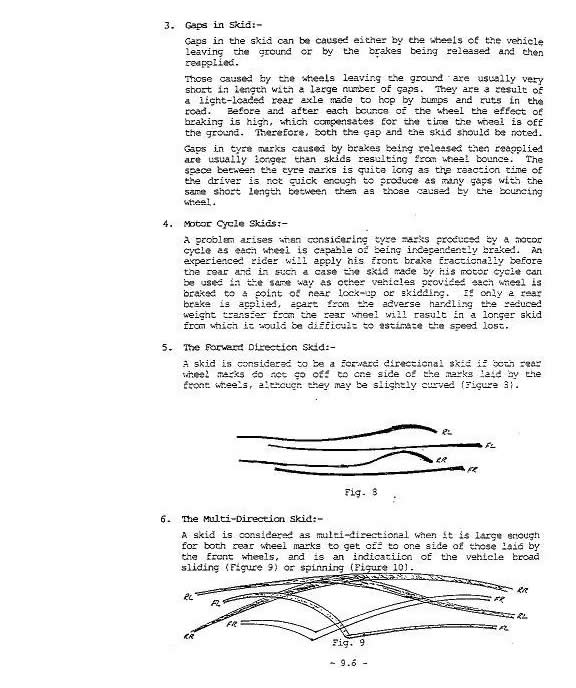
|
Img162 - Extract from Police Manual - Please note the number of skid marks on the road from a single vehicle in the illustrated data below in comparison to the single skid mark on the road in Andrew's accident. This single brake mark on the road occurred as a result of the left wheels of the utility mounting the curb and then travelling on the grassed area of the traffic island
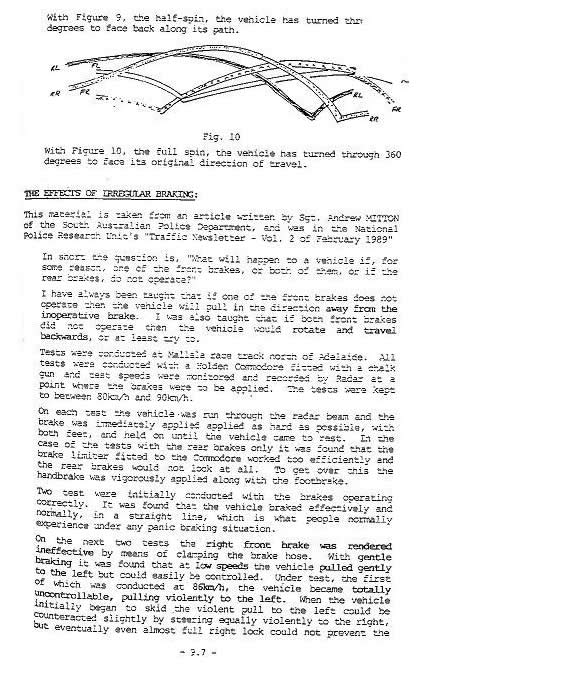
|
Img163 - Extract from Police Manual - continuation of the above image
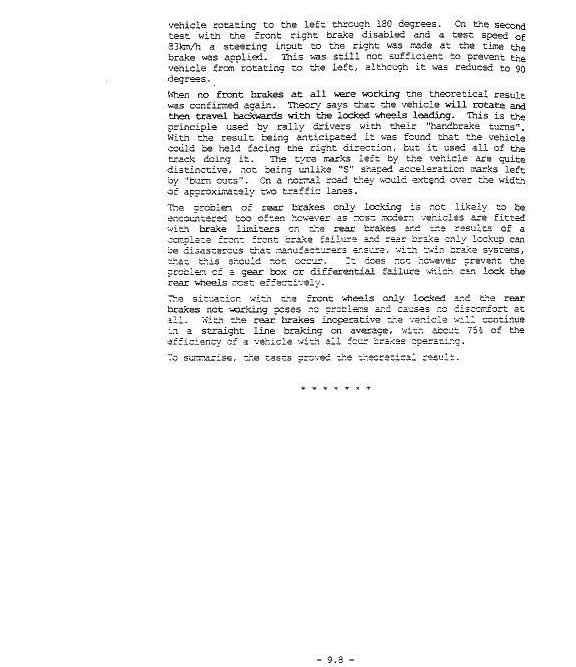
|
Img164 - Photograph of the approach to the intersection from Pritchard Road
A photograph of the approach to the intersection traveling on Pritchard Street towards the intersection. The tip of the red arrow illustrates the point of the the right hand turn lane going into Port Road. I am standing at the stop sign. As can be seen it is a sharp right hand turn towards the stop sign. It is a T intersection. As can be seen there are no directional signs at the intersection, i.e. signs pointing to Brisbane westwards and to the Port of Brisbane eastwards. When I viewed the accident site the day after the accident, I could not work out what happened. My sister, Margaret Samootin, showed me the blood stain on the road and photographed me next to it. It seemed to be an awfully long way from where the collision was said to have occurred and that is in the middle of the intersection. Furthermore, there is no way that Andrew would have gone through the stop sign as he had a clear view to the right, and not only that he was always careful on the road. He was an expert cyclist. He was a fitness fanatic. Please refer to the Surveyor’s map of the accident site, as this gives a clear view of the angle of Pritchard’s Street right hand turn lane
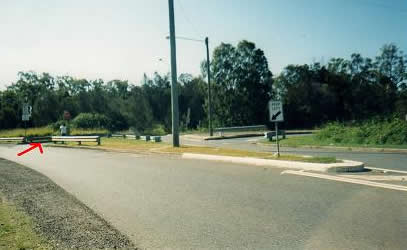
|
Img165 - Letter from the Prime Minister
I wrote a letter to John Howard, the Prime Minister about Andrew being set up to have an accident and used as an illegal organ donor. Hereunder is the reply that I got dated 25 August 1999. I was told more or less to rack off. One would think that if there is such a contravention of Universal Declaration of Human Rights, that there would have been a more significant inquiry carried out by the Department of the Prime Minister and Cabinet
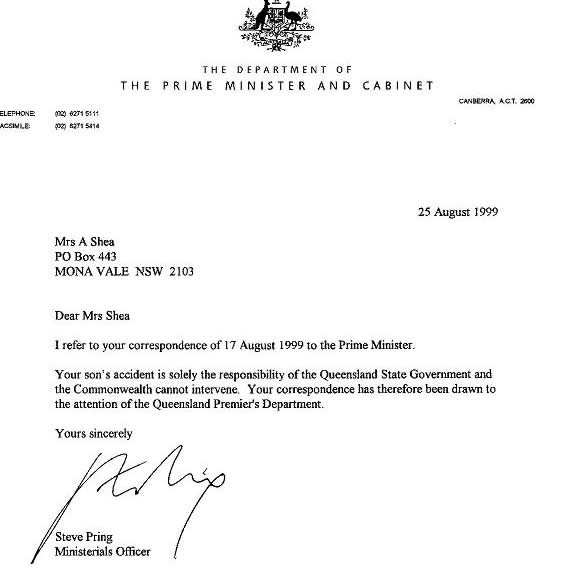
|
Img166 - Letter from the Attorney-General and Minister for Justice, Queensland
I wrote a letter to the Attorney-General and Minister for Justice, Queensland, to re-open the inquest into my son’s death. That is Andrew was set up to have an accident and used as an illegal organ donor. My son was murdered in a horrific manner. The Attorney-General refused. I consider this to be a massive cover-up and a continuance of what had occurred to my son, as occurring to other innocent victims. I had been told by George Moss, then a staff member of the Coroner’s office, that my son was the fourth person to be brought in to see if he was the right test match for the Coroner's "operation". I was told by George Moss that Andrew had died at the time that the Coroner had his "operation". I was told by him that they had to wait to see if it "took". It "took". The Coroner recovered and then was able to resume his work. He had mountains of work stockpiled on his desk. Before the operation, the Coroner "could hardly move his legs". I noted that after Andrew’s accident that a number of persons got a lot of money; went overseas on extended holidays; purchased new vehicles and etc. It appears on the face of it that public monies are used to pay persons off for their involvement in illegal activities
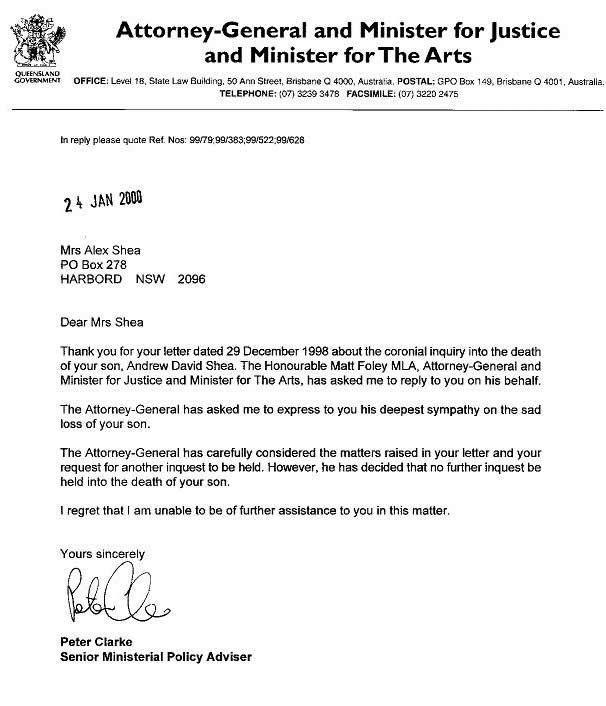
|
Img167 & 168 - Letter from the Human Rights Commission, Sydney, Australia
I wrote to the Human Rights and Equal Opportunity Commission, Sydney. I got a negative reply dated 24 June 2004. The writer clearly understood my complaints, i.e. “You claim you were advised by the Queensland Police that he was killed instantly but you have subsequently found out that he was taken into Police custody alive, tortured and then killed on the 3rd day after the accident as an illegal organ donor”.
In Andrew David Shea’s murder, there was a contravention of Universal Declaration of Human Rights Articles 1, 3 and 5.
In regards to the Coronial Inquest into the Death of Andrew David Shea, there was a contravention of Universal Declaration of Human Rights Articles 6, 7, 8 and 10.
The Human Rights and Equal Opportunity Commission should be called another name, as the name it has is very misleading as to the nature of the complaints that they deal with. And really, all said and done, if they really wanted to do something about Andrew’s case, then there would have been further inquiries and submissions. Our government officials are nothing but a bunch of “show ponies”. The “show ponies” excel in collecting a nice fat pay check for their non existent services on human rights issues
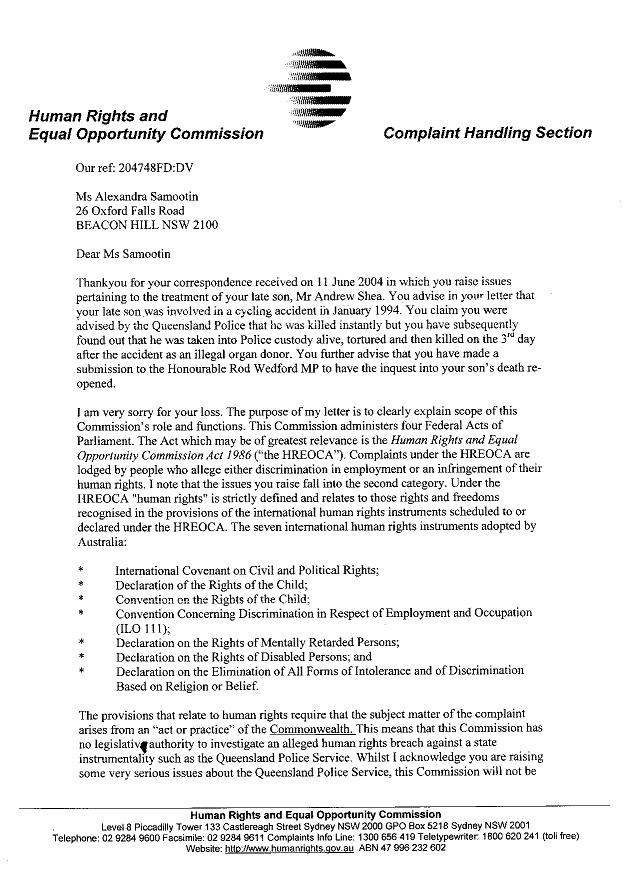
|
Img168 - 2nd page of the above letter
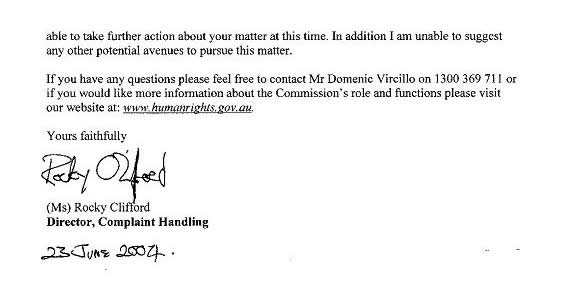
|
Img169 - Scott Anthony Bryant's unsigned police statement prepared by Constable Johnson on 16 November 1996. It was tendered as evidence by police. In this statement Scott Anthony Bryant states that he does not recall the car that he claimed he was driving at the time of the accident.
In Constable Ben Dyball’s notes Img132 and 133 it is claimed that Bryant was traveling in a red Ford Falcon 045CEW. Whereas in the police statement Scott Anthony Bryant claims he was driving a Datsun Stanza. In reality Scott Anthony Bryant did not own a vehicle at the time of the accident – see letter from the Department of Transport dated 12 February 1998 wherein it is stated that Scott Anthony Bryant did not have any motor vehicles registered in his name in Queensland on 12 January 1994.
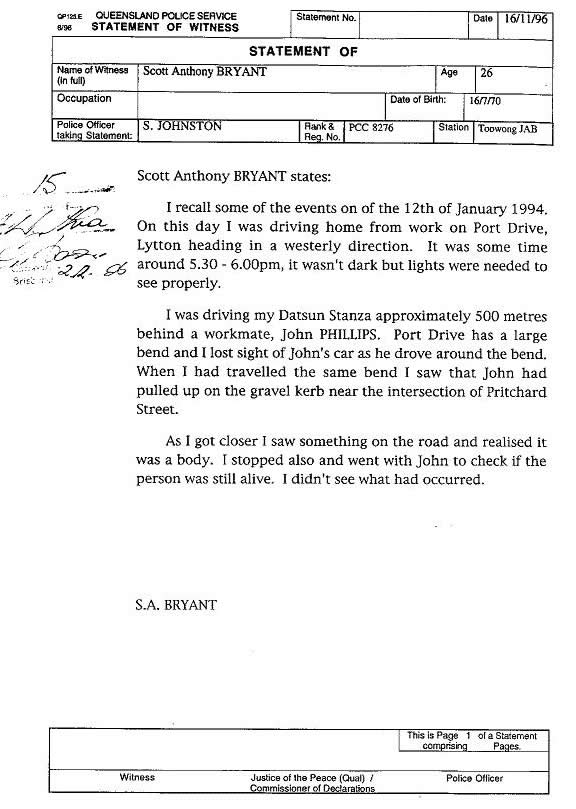
|
Img170 - Police statement from the ambulance driver John Stephen Rennie.
John Stephen Rennie says that he was despatched to a motor vehicle accident. He states that he spoke to the driver of the other vehicle involved in the accident. Andrew was not driving a vehicle at the time of the accident. Furthermore, the records show that the police were already at the accident site when the ambulance service was called via the 000 number. This statement was not co-signed by a witness. The date of the statement is 29 November 1996. The date of the hearing was 2 December 1996
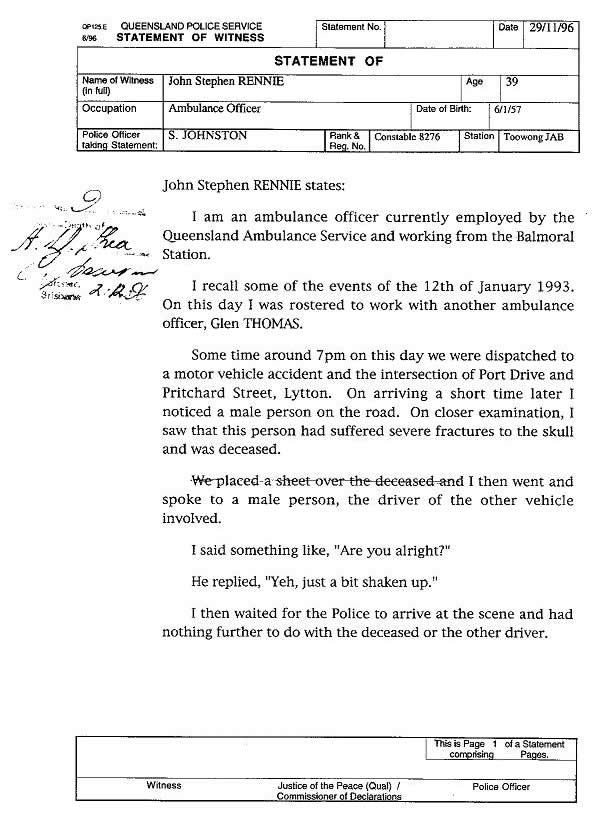
|
Img171 - Continuation of the ambulance officer's police statement
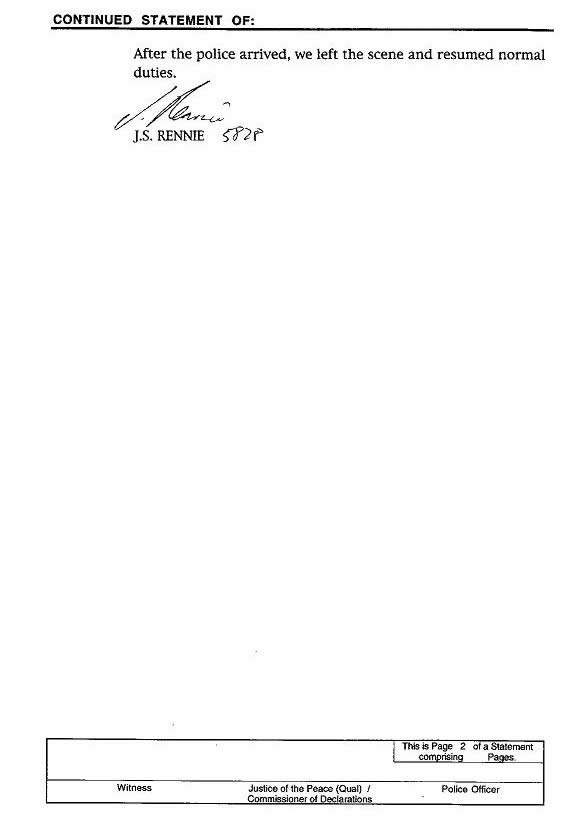
|
Go to top of page |
|